#basically the only child thing is an oversimplification
Note
when tommy and billzo first met, the latter made a comment, obviously dripping with sarcasm, that tommy, being an only child who always got what he wanted, must have gone through a lot of struggles in his life. i think that sentiment runs through a lot of their interactions and can make banter that should be lighthearted hit harder than either recognizes. i also think there's some truth to tommy being raised to expect to get his way and that this might bleed over into what's going on with ranboo
This adds to the question of what the hell Billzo went through at home, because he keeps alluding to some pretty out-there behavior as being normal. If my memory is working right he talked about handcuffing Wilbur to the railing and throwing away the key as being brother stuff, so who knows how much resentment he holds by default to people who seem ‘spoiled.’ It seems to be a big unspoken sore spot for him that others don’t have to be as ‘tough’ as he has been.
Personally I think that Birth Order is a bit of a meme because it implies that all parents and siblings are made equal otherwise, which isn’t often the case. Only child syndrome hits different when your parents expect you to take care of them, for example. Tommy might have been an only child but the joke with him was that he still had a mundane upbringing even when he was blowing up—it doesn’t seem like he got ‘his way’ by being unreasonable at home, that might have been a part of him that flowered online. (He was, above most things, a baby troll, and I would caution confusing overcompensation with self-esteem. Tommy’s disintegration point is Three, he gets more defensively narcissistic the worse he feels.) He might have avoided lessons in resource sharing from being the only child, but that’s a socioeconomic status thing as well as a sibling thing.
He might often try to get his way, but on the other end of the spectrum he seems to be out for himself in a way that suggests scarcity and a fear of neglect; he’s a very animal-brain boy. He’s got a mild empathy problem either way, so he has a complicated relationship to perspective-taking at this point in his life.
My fixation is personality psych, so I’m less likely to chalk up people’s traits to being strictly caused by outside factors. The one thing I can offer is that Sixes Hold On For Dear Life when they want to. When they really like someone, they are the ride-or-dies, the obsessives, the dreamwastakens. Tommy wanting to spend as much time as possible with his favorite people was a bit predestined, it was just a question of who it was. It probably comes off as more reasonable to him because he just wants to hang out with his friend Ranboo, and why should that be a problem for Bill? The details don’t matter as much if he doesn’t scrutinize them too hard.
#tmmy 6w7#blzo 2w3#I feel like the most important thing I can tell you about Tommy is that he is a medium sized dog#or perhaps a thin warewolf#he is also a robot#I don't know much about his home life but I recall something about his mother celebrating being sober#and that feels like a puzzle peice#for someone who is predisposed to seek attention and stability#basically the only child thing is an oversimplification#gen tmmy tag#gen blzo tag
5 notes
·
View notes
Text
Fun Fact: As Saiyans go, Raditz isn't just weak; He's a talentless hack. Nappa is much more talented at martial arts, but his skills are undermined by him being a complete fucking moron.
Raditz is our introduction to the particularities of the Planet Trade Organization - or, well, the Saiyans since the PTO didn't quite exist as a concept yet when he showed up.
Toriyama only came up with the PTO later in the arc. It's honestly kind of funny; Vegeta's referred to as the "Strongest in the Universe" a couple times in this arc because the idea for Frieza doesn't exist yet. The original plan was that the Saiyan race are the ones doing planet gentrification on their own initiative, but they were almost all wiped out by a meteor so if we take out Strongest in the Universe Vegeta, we'll put an end to it.
So all this stuff like the spaceship pods and Scouters that was original Saiyan equipment and methodology got retooled into being PTO equipment and methodology.
But I digress. We meet Raditz and he's unlike anyone we've seen before. He immediately starts shit with Piccolo because they're both assholes, and we see how he operates.
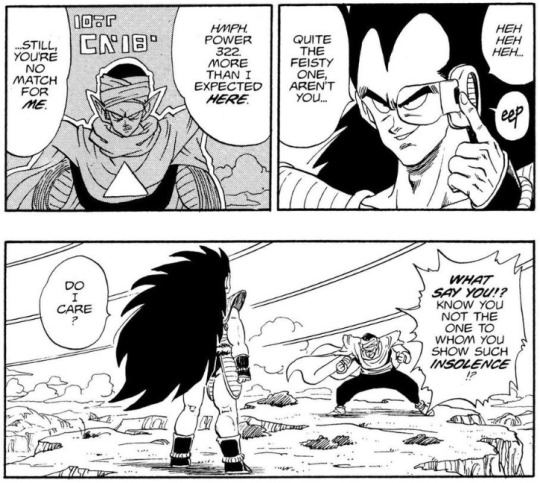
He has a little doodad that reads off someone's "Battle Power" into a flat, easily digestible number that even a child could understand. This is the industrialization of martial arts, simplifying it into something that can be replicated and mass-produced.
It's the difference between teaching swordsmanship lessons in your dojo versus handing someone an AK-47 and telling them to go shoot the enemy.
This is the key distinction between the Saiyans and Earthlings, that made Goku - A Saiyan raised on Earth engulfed by their martial arts philosophy - so formidable. The Saiyans and by extension Planet Trade's culture is built on capitalist efficiency. Their warriors are carefully measured, analyzed, and matched with suitable challenges. They aren't trained. In fact, Vegeta scoffs at the idea of it.
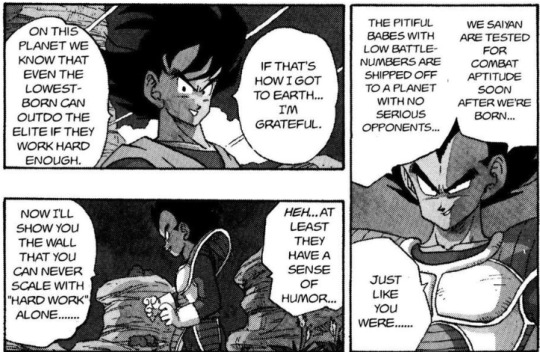
They're battle-hardened.
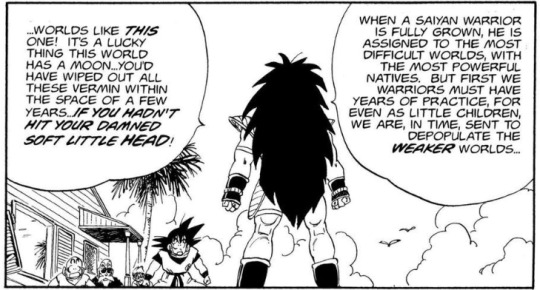
They measure their fighters and quantify their abilities into a number, then select the right target that matches that number. Those warriors become stronger through fire and frenzy, rather than by studying principles of martial technique.
Consequently, upwards mobility doesn't seem to be a thing. Nobody in the PTO got to where they are by working hard and improving themselves. Every single one of them is naturally gifted, coasting by on whatever privileges their birth afforded them. Especially Frieza.
They aren't practitioners of an art. They're cogs in a machine.
Raditz believes these distinctions made Goku weaker.
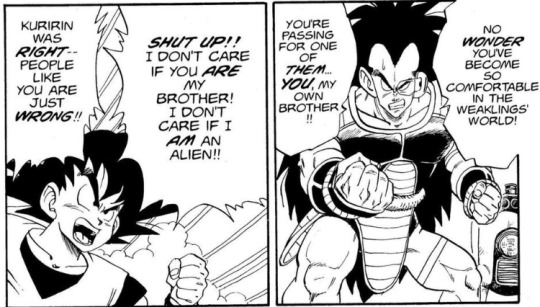
He has no idea. The limitations of the PTO's methodology is a recurring theme in the Saiyan and Namek arcs.
Raditz is a low-class Saiyan. By virtue of being a Saiyan, he's still unbelievably powerful compared to the terrestrial races of the worlds he's sent to. But power is all he brings to the table; He's an unrefined juggernaut who coasts by entirely on Big Number Go Brrrrr. Philosophically, Goku is unimpressed.
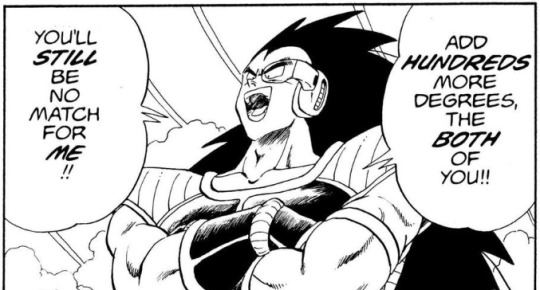
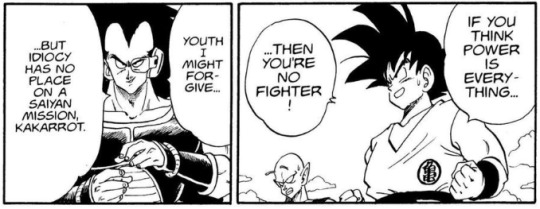
Coming from Goku, that's a pretty sick burn. He's already lost to Raditz once; He knows how Big Number this guy is. But he can't bite his tongue at Raditz's oversimplification of his art.
As a fighter, Raditz delivers what he promised. All he has going for him is Big Number Go Brr... but it's a really big number.
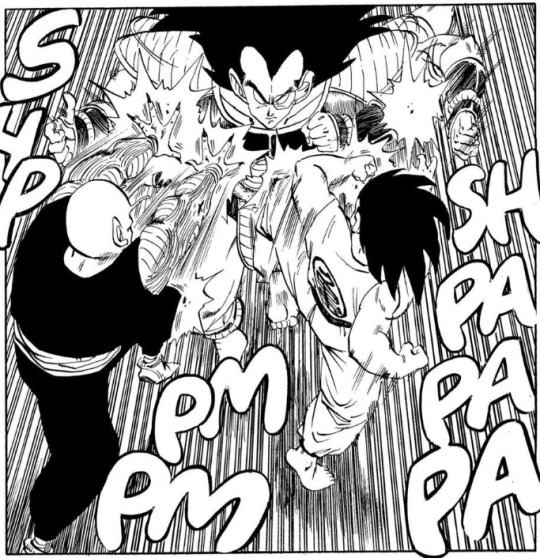
Raditz is impossibly strong, impossibly fast, and his basic-ass ki blasts are impossibly powerful. The gulf between Goku and an adversary has never been so huge before.
And yet, for all his power, he is repeatedly startled and befuddled by Goku and Piccolo's training and technique. These weaklings are breaking out abilities he didn't even know were possible.
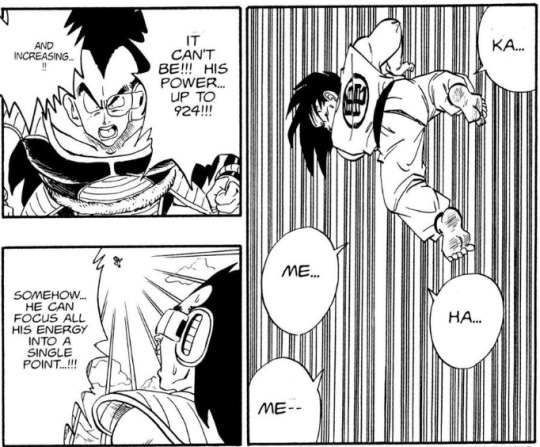
Raditz watching Goku power up the most basic ki concentration technique on Earth and exclaiming "WHAT IS THIS SORCERY!?" really tells you everything about the PTO's methodology, doesn't it?
Raditz falls for every trick and every shenanigan that these guys have spent their careers honing, forced to rely solely on tanking attacks with his tremendous Numbers.
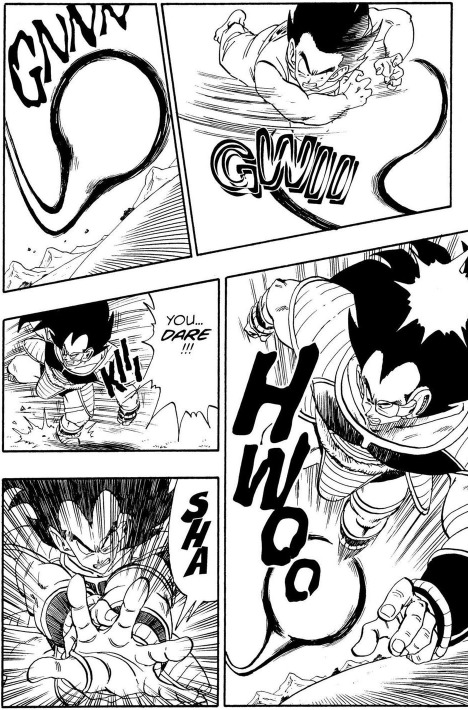
This dipshit hasn't even trained the weakness out of his tail.
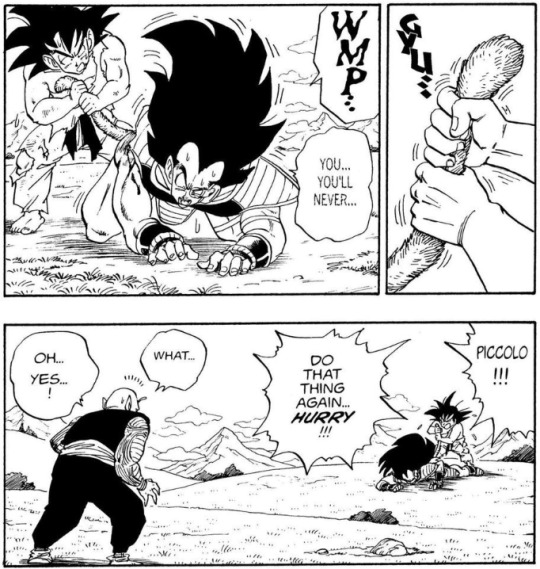
Goku was fifteen years old when he trained his tail and eliminated this vulnerability.
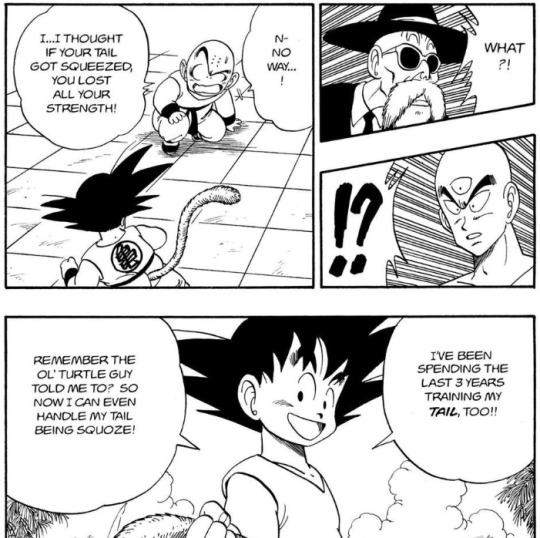
Raditz is less proficient than Goku was as a child. This isn't even the PTO's flaws manifesting through Raditz, either. Nappa and Vegeta trained their tails.
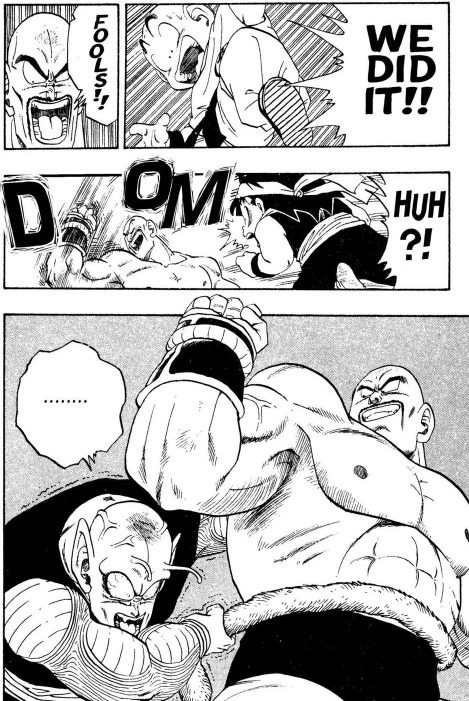
"LOL What kind of a useless clown doesn't train his tail?" ~Nappa, probably. Oh, wait. No. Actually.
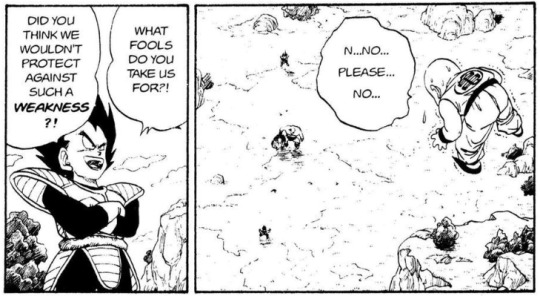
~Vegeta literally.
Raditz is limited by the philosophy of the Planet Trade and he's also on the weaker side of Saiyans, but he also sucks even without taking power levels into account. He brings absolutely nothing to the table. He reads someone's number to tell him in advance if they'll fall down when he punches them, and then he punches them if the number tells him he's clear.
Raditz isn't a fighter. He's a bully with a gun.
For his part, Nappa is a more advanced version of Raditz. His Big Number Go Brr is even bigger than Raditz's and he's familiar with more advanced techniques beyond "Throw this ball of ki at your face".
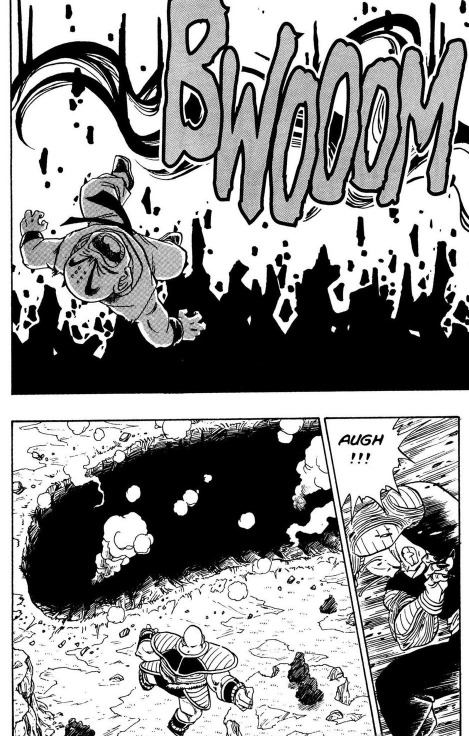
As a front-line fighter, Nappa is unbelievably tough. Blow after blow and attack after attack, he never gives as much as it feels like he should. No matter what they do to him, he keeps getting back up and coming back, more bloodied and bruised than ever but ready for another round. He is unbelievably resilient.
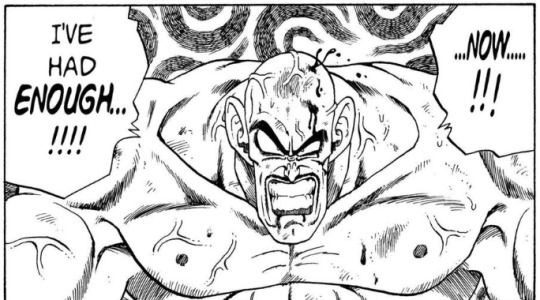
Fighting Nappa feels like an exercise in futility. You're going to have to kill this man to put him down because he'll accept nothing less. Even when Goku takes the field, he finds himself at a loss with Nappa's absolute unwillingness to take the hint and lose consciousness already.
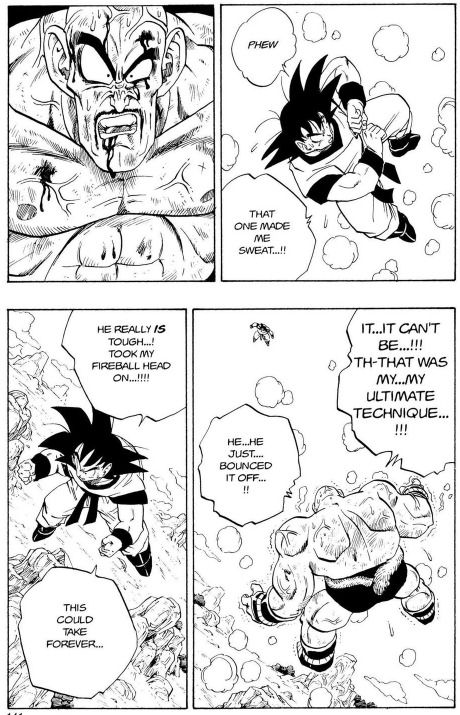
Nappa is a brick wall. Goku only finally manages to end this by breaking his spine so he can't keep getting up again.
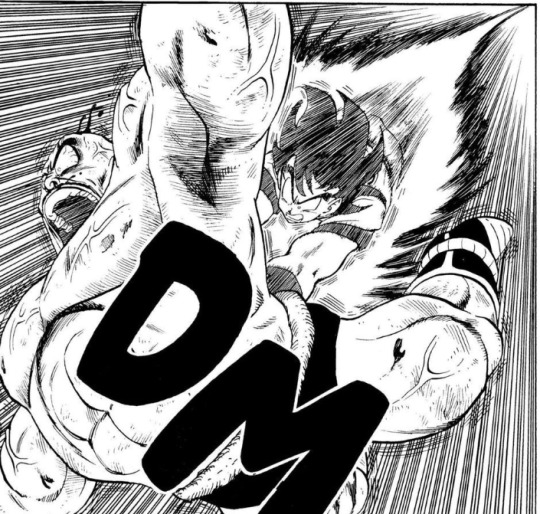
That is what Nappa brings to his table. Though it's worth noting that his Sisyphean endurance is something Vegeta shares as well. It's not unique to Nappa. Fights with Vegeta are every bit as much of an ordeal as this bout with Nappa was.
Saiyans are hard to put down.
Nappa's biggest weakness, however, is simple: Like Raditz, he's coasting on his brute strength. He doesn't pay attention to what's happening around him, and is easily blindsided by sudden attacks from other fighters in this brawl.
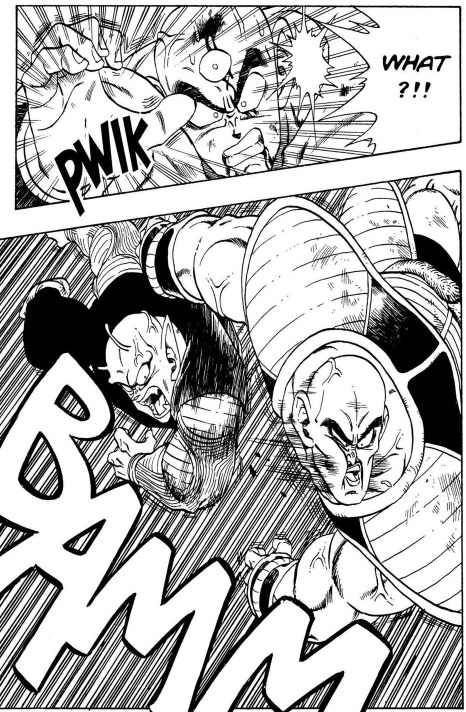
Or baited into incredibly poor decision-making.
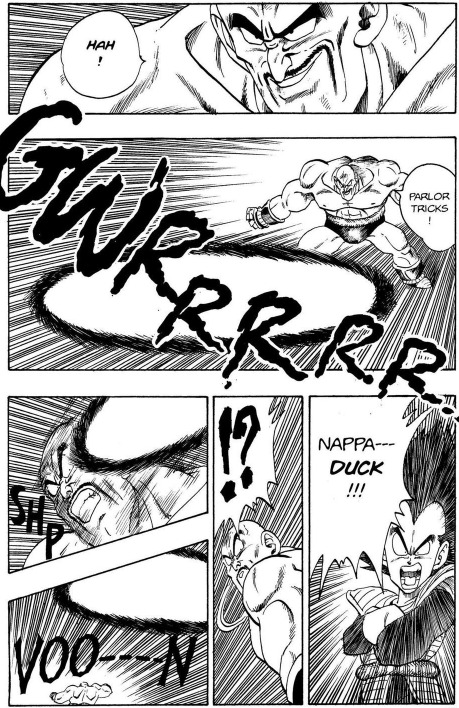
For all his Saiyan might, the Earthlings would have killed Nappa well in advance of Goku's arrival, if he didn't have Vegeta to watch his back. I'm half-convinced the only reason he trained his tail is because Vegeta told him to.
Nappa is very much a follower. He does what he's told. He's honestly a better Saiyan than Vegeta in the sense that he. Like. Cares about other Saiyans? His kneejerk reaction when Vegeta suggests taking Earth's Dragon Balls is that he wants his friend back.
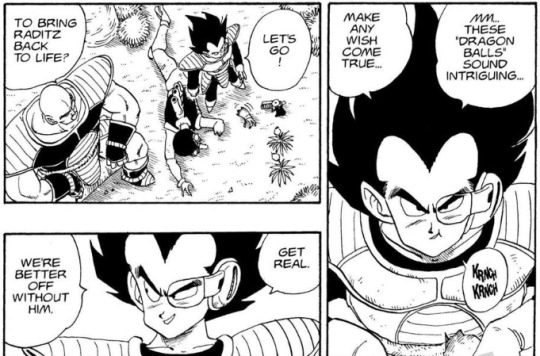
And he's filled with eugenic fervor for the glory of the Saiyan race when he finds out what mixing Saiyan and Earthling physiology can do.
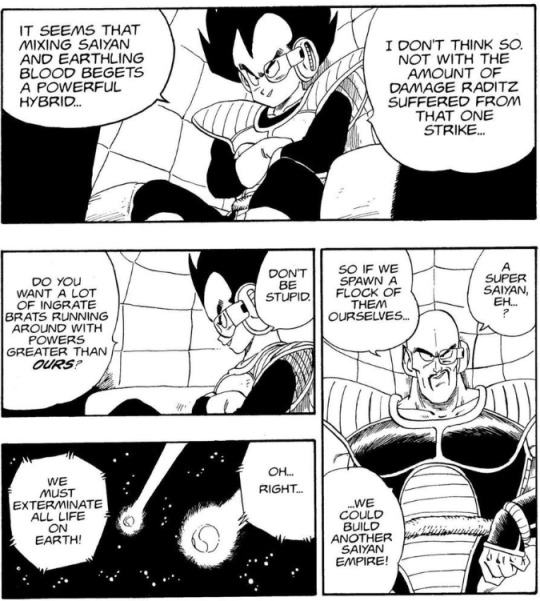
Fun little side note: "Super Saiyan" was originally the term used to describe Gohan's hybrid abilities before it was recontextualized to mean something else on Namek.
It's honestly interesting to look at their interactions and realize that Vegeta is a cruel, monstrous, selfish bastard even by Saiyan standards. Vegeta is uniquely wicked within this culture of for-profit colonizing murderers.
But Nappa defers to Vegeta every time. Vegeta tells him, "No, you're wrong," and Nappa pivots to supporting whatever Vegeta just said instead. Nappa obeys.
But he doesn't listen. Vegeta and Nappa were following the action while Raditz was fighting Goku and Piccolo. They saw all of the strange anomalies that occurred, that Raditz couldn't comprehend. Vegeta spends this time thinking about what this means for Earth and re-evaluating his assessment of the foes to come.
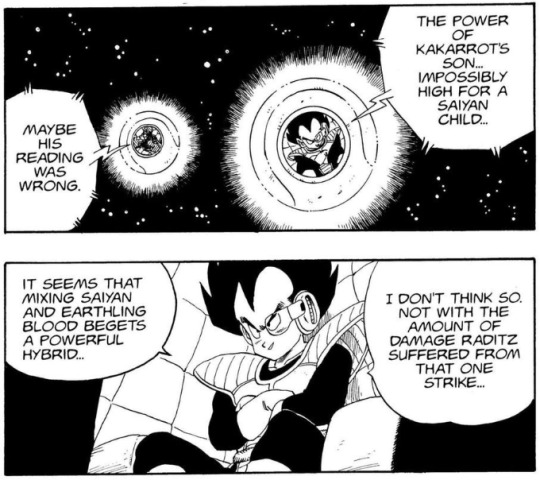
And he adjusts accordingly. From the moment they arrive at the fight, Vegeta pegs overreliance on the Scouter's readout for the vulnerability that it is.
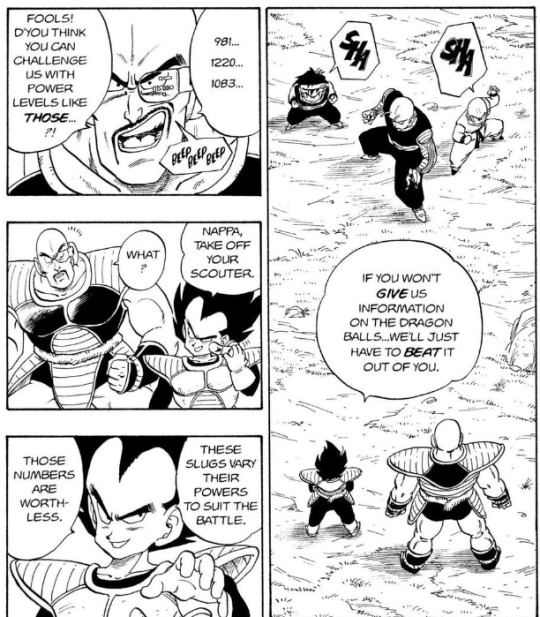
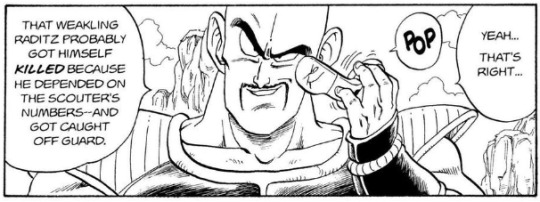
Like. He says this. He acknowledges that he understands. And not five minutes later:
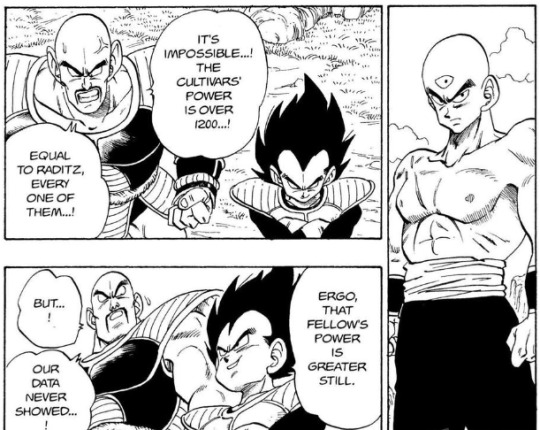
BUT THE NUMBERS, VEGETA
THE NUMBERS SAID NO
Even then, Nappa flat-out ignores The Numbers if he doesn't like what's printed on them.
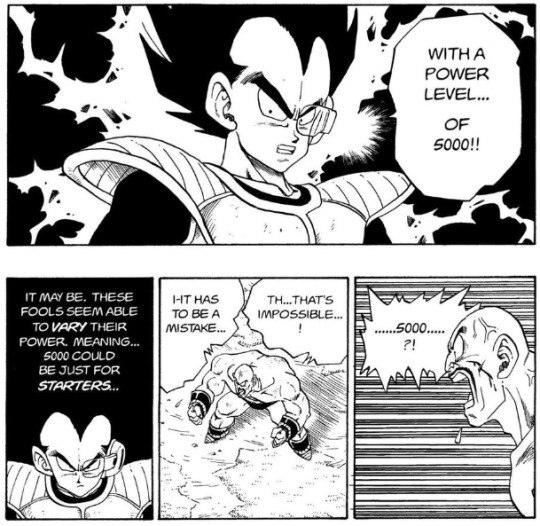

Nappa and Vegeta both disregard the printout this time, but in different ways. Vegeta observes that Earthlings suppress their ki, presenting a smaller number than their true ability. So when the Scouter says 5000, that means Goku's true level is likely well beyond that.
Nappa observes that Goku is probably weak so that's stupid and you're wrong.
Nappa just does things. He doesn't think or pay attention to what they're doing. He destroys a city as soon as they arrive, and Vegeta immediately lays into him for what a fucking idiotic thing to do that was.
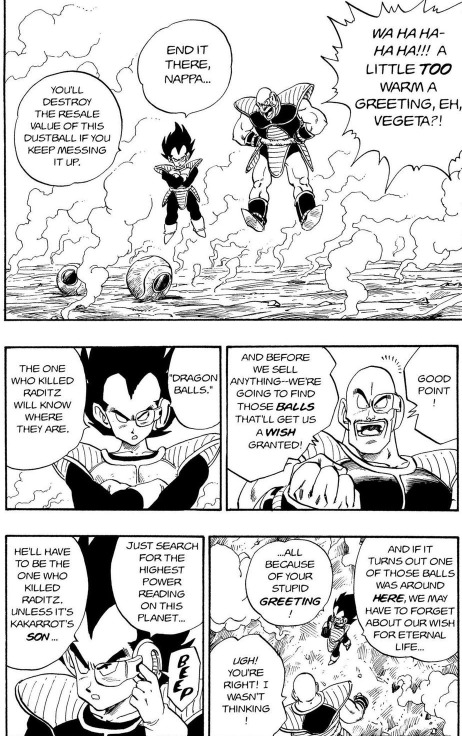
He's a beast on a chain, barely restrained by his deference to Vegeta. Powerful, seemingly unstoppable, but needing Vegeta to hold his hand and walk him through the higher concepts of combat and martial arts.
An absolute fool. But a Saiyan elite fool.
98 notes
·
View notes
Text
Man, I really regretted looking up Undertale Characters and Undertale Sans analyses on this here site:
Like, there is a reason I avoid doing that more often than not on tumblr (and some other sites), because a lot of the time I just across takes/analyses/etc. that I just really (personally) don’t agree with and/or like.
Even by creators that I can, have, do, and/or did like, and seemingly “well-liked”/”well-accepted” and/or “popular” takes.
Disclaimer: If you like or agree with any these takes or similar ones; that is fine, we all have different opinions. I just tend to not really like these takes.
The takes in question. These are just UT/DR takes and ones I have mainly come across today and fairly recently (some of these takes are actually done by fans of these characters; that doesn’t mean I like or agree with them still though (putting the rest under a “read more” cut, because this gets pretty long, and in case people don’t want to read about these takes):
“Toriel is homophobic” (just uggghh, no. Just no).
“Sans is useless and/or serves no purpose (in the game, battle, narratively, thematically, and/or etc.)” (basically) (this, just isn’t true at all, and I really, really (like, just a lot), hate this take/these takes).
“Sans is weak” (also hate this take).
“Sans is just some guy and/or a nobody now”, because he now can’t be a badass and cool and powerful and smart (which, he is), while also being dorky and edgy and vague and a generally nuanced and a flawed person with layers. I guess. Not allowed. Talk about fandom over-correction (imo).
“Toriel is just a Mom and basically has no other character traits or flaws.” pretty much (Just no and is a huge oversimplification of her character).
“Chara is abusive/Chara abused Asriel” (Chara, who is also, just a iteral child. And someone who was probably traumatized and hurt in the past. Chara wasn’t perfect, but to say this, I just can’t agree with it really).
“Papruys is now the strongest character in Undertale” (he is strong and powerful in his own right, but this is just unfair to the other characters, and is kind of over-stretching stuff imo. Like some Sans take(s); I also mostly blame this on fandom over-correction).
“To make Paps interesting we now have to make him edgy” basically (less a statement, and more a trend I see sometimes). There are many ways you can make a character interesting for instance. And 2nd of all; why try to make a non-character edgy, when we got more actual edgy characters like Sans, Chara, Flowey/Asriel, Gaster I guess, Muffet, I guess, heck, maybe even Toriel, and/or etc.? Not saying Paps isn’t interesting btw; he is. Just saying some people seem to only think they can make him interesting by making him edgy. Not even against edgy Paps completely; I’m not. Just trying to say there are other ways to do things/you could do things.
“That somehow Flowey/Asriel (and in the case of some fan stories; Gaster too), is a better person than Sans is” (don’t get me wrong, Sans is a morally questionable/morally grey character (and I love that about him). But the amount the shit he gets sometimes, while arguably, characters who are just as bad, worse, and/or (more) ill-intentioned than Sans get more of a pass is just like, “what?”
“Flowey did nothing wrong” basically (this comment kind of goes hand-in-hand with what I say in the previous paragraph. I do get he is technically a child still, and he is a good character. But like, he still did many, many things wrong).
Not really a character, just a take I didn’t agree with at all, “Undertale’s meta aspects and time travel isn’t needed and basically make the game worse, and game would have been just as good, if not better without them”, (and I am like just "????”, about those things. Those things are so important to Undertale man, and they don’t make the game worse, they make it better. Like, what do you even mean?)
Etc., etc.
So yeah, really didn’t like these takes at all. And I mean, AT ALL.
Welp, at least the somewhat sour taste these left in my mouth hopefully helps me more careful while searching for and/or looking up analyses, metas, etc. on tumblr and/or etc.
I have hopefully, learned my lessons now.
#chatxkilluaxnoir#undertale discourse#undertale fandom discourse#undertale fandom(s) discourse#fandom#fandoms#discourse#should i use any main tags for this post?#ah screw it#i will use the ut and undertale tags for now#the read more cut and the rest of the tags i put should probably be good enough for now#but i might or might not remove the main tags/some main tags later#chat's posts#chat's rants#chat's discourse stuff#chat's stuff#ut#undertale#hot take#hot takes#i guess. maybe#in some form.#either the takes i am posting or me not agreeing/liking those takes could be considered a hot take possibly.
53 notes
·
View notes
Note
You know that joke about how the voltron reboot feels like it was written by people who hate giant robots? Netflixvania feels like it was written by people who hate any monsters that aren’t vampires. And also shonen. It feels like the writers wanted to do the vampire chronicles instead or something.
Shdksskksk I only have second hand knowledge of the trainwreck that was voltron but man
And yea! The vampire favoritism is huge, considering how we're supposed to feel pity for them despite their atrocities w no redeeming qualities. They dont write them as nuanced monsters with some trying to coexist despite their nature, they're basically amoral fanged elves who are mistreated by those simple minded hunters :( (ignore the atrocities they commited on screen 5 minutes ago). And with this ask i do realize they placed other game's bosses to the sideline. My memories of the show are blurry but i don't remember any non vampires being part of Dracula's generals or having mayor roles (aside from uhh, Legion and Abel?)
And this truly shines in the way both Alucard and Death (and the belmonts) were rewritten, the former went from a tortured soul who sealed himself to stop his cursed blood, to someone who considers vampires his kin and defend them from the belmontd in the face of their implied child murders; and the latter who went from a spawn of Chaos with the purpose to serve the Dark Lord into an special soul sucking vampire who speaks like a league of legends player
It just feels like it tries to tell a gritty grimdark story, which doesnt works with castlevania ( cv is a silly monster smasher! And with optimistic tones! It's part of its charm),and it doesn't works on it's own ( the writing doesnt has the maturity and it doesnt takes itself seriously, not with the gratuitous vulgarity and oversimplification of nuanced subjects). And its pretty sad bc a shonen esque tone would suit Richter n Maria's story so well (the RoB cutscenes my fellas!)
Like i said tho, my memories of the show are a bit diffuse ( thank the gods) so i apologies if i have gotten things wrong and such
#anti netflixvania#netflixvania rants#i also dont have much knowledge of LoL for that matter. but the myths of it's toxicity have reached me. oh to be such a hater#nor of vampire chronicles for that matter. heard it's pretty good but yea i already have a long book/show queue#anyways i'll forever be disappointed in asshole nfcv Alucard. he doesnt gets his asshole arc until his Arikado era smh smh#me answers
18 notes
·
View notes
Text
Matt Mullenweg
I recently read @photomatt post about why casual porn doesn’t work in the current era of the internet. While I understand what he is getting at, I do not agree with the way he’s framing the issue. He claims that companies are anti-porn and that the stringent rules enacted by app stores are what makes managing porn on social media sites so difficult. I think this is an oversimplification and what the real issue is.
To his first point, Credit card companies are not strictly anti-porn, they are in fact anti-illegal porn. I mean who wouldnt be? This includes things like, child porn, revenge porn, and nonconsensual porn. Companies like Mastercard, Visa, and Paypal didn’t just decide to no longer deal with Pornhub anymore, they saw reports that these things were on Pornhub and decided to pull out. More than likely to avoid, what I can only imagine to be a legal headache for all parties involved. These are also the same exact things that Tumblr was having huge problem with in 2018, instead of dedicating the resources to fixing the problem Tumblr pulled the plug on it all together. This was also something users had been telling Tumblr about for a long time, but a mix of a bunch of different issues made it impossible for them to handle it effectively internally.
Like I said I understand where Matt is coming from, but instead of acting like it’s out of everyone’s hands maybe just admit plainly that dealing with porn is a massive headache that Tumblr doesn’t have the resources to deal with right now. (Which he KINDA does at the end of his post.)
His second point is true however, Apple has been historically anti-porn for a long time. However, I think this has more to do with the fact that Apple knows how big it is and how much power it has to shape the tech landscape. That’s why Apple gets to basically do whatever it wants with anyone who wants to deal with them.
Why do Twitter and Reddit get to have adult content and still exist on the app store? Well that’s because Twitter and Reddit managed to get around Apples rules by not allowing someone to just see NSFW content without at least logging in to the service. As well as not being exclusively advertised as apps/sites for porn, although I don’t think Apple personally cares if Reddit or Twitter are on their store or not.
Matts point on a dedicated service or company does not make a lot of sense to me, because these services already exist, online and most adults would not have any issues finding it if they really wanted. The issue comes back down to content moderation and verification, this isn’t just a porn specific issue but an internet issue.
Not to mention the fact that Matt seems way to into the crypto hype that will surely bring about a magic bullet that fixes all of the online issues that come along with running an online space of any kind. but thats a post for another time.
I'm not criticizing @photomatt expertise or insight on how difficult content moderation is, let alone adult content moderation. My criticism is that he tells users to go and bang on the doors of these corporate giants to enact change. While @photomatt and @automattic have the full power in their hands to lobby themselves for these changes.
If Matt wants that crypto-utopia to come to life, he should acknowledge that the foundation for that is being built on sand. As we've seen with Meta and the rest of these services, this includes the current dumpster fire that Elon Musk has created over at Twitter. In the end I want to see Tumblr grow and be the comfy website I think its always been, but that wont happen until they pull up the rug and address the foundational issues that are leading all other sites down the drain.
#tumblr staff#tumblr app#twitter migration#follow me#follow back#tumblr related#tumblr advertising#bring the hellsite back#matt mullenweg#automattic#thought of the day#all hail elon musk#elon twitter
7 notes
·
View notes
Note
After reading Emeries interaction with Danae it was sad to see that when Danae finally meets someone who was able to have an “out” but it seems Emerie wasn’t too keen on really listening and processing Danaes message. She snitched to Rhysand and I hope Emerie didn’t use the words treason. Also Rhysands interactions with Danae and feyre were on point and in character because he is excellent at deflecting and twisting scenarios to paint himself the victim. Poor Feyre just laps it up because he is all she has and she doesn’t ever question him (even though she knows his dubious ass can lie and manipulate like girl come on what happened to book 1 feyres inquisitive nature?) But Rhysand was pissing me off cause he knew all of Danaes criticisms were valid and his guilty conscious is choosing to call it her being treasonous. It was crazy how easily he was able to convince feyre to not go talk to her then and there and talked feyre out of thinking bringing Danae to velaris would be a good thing. But Rhysand is smart cause he knows Danae would be upset because HE KNOWS it is unfair 2/3 of his people suffer while the smallest population of the night court lives in paradise(I refuse to believe ALL the citizens of hewn city are “evil” . so you’re telling me Rhys and Mor are the only dreamers from there?)But he doesnt care and it seems Emerie proved Danae that she can’t trust all the illyrians she sees that are close to the high lord(she def can’t rely on cass cause he’s the #1 boot licker). Danae sees a free Illyrian woman and is happy for her, I like that there wasn’t animosity. But Danae feels there’s more work that needs to be done than sweeping her off into velaris. And when Rhysand said velaris can’t hold all those people (he loves his excuses) all that money that goes to his newly built mansions can easily go into expanding velaris come on now. He’s so rich I know taxes are crazy in the night court.
Ooh ok ok lots to unpack, nonnie 😁
First disclaimer: my darling emerie didn’t go snitching to Rhys about their convo, he literally asked her to do it. She couldn’t exactly back out after her high lord told her to do something and she agreed. But she didn’t use the word “treason”, I can tell you that for sure.
This chapter had me sweating bullets while editing because I really want to show Rhysand’s thought process a bit, but from the pov of someone whose bullshit radar is hella accurate. Unsurprisingly, he lies to himself a lot. I don’t think it’s intentional, but he’s spent 500 years believing he’s the cauldron’s gift to prythian and hot shit, so any kind of doubt needs to be explained away (this is an oversimplification, but I hope this makes sense). He has a hard time seeing his own mistakes, because if he just keeps giving and giving and sacrificing and sacrificing, he must be doing a good job, right? That’s what he’s telling himself. Everything he was saying to Feyre, he believes it, or he’s convincing himself to believe it.
It’s hard to see your own fallibility and flaws as a human being, I imagine it’s even harder when you’re basically immortal and you’ve had centuries to embrace questionable behavior/character traits/excuses/etc. Just like Emerie is a victim to the Illyrian thought processes and she’s stopped questioning things as much, Rhysand isn’t questioning things either. “It’s the way it’s always been” is an excuse for a lot of issues in Night (and the rest of Prythian, Night isn’t the only problem child on the board). The Court of Nightmares, Velaris being a secret, his own goodness being a secret, the crappy Illyrian traditions of subjugating their females, and probably other things I can’t remember rn.
The court of dreamers has old, dusty and crusty dreams. 500 years ago, they were just as rebellious as Danae is. This time, Danae is coming to stir the pot of tradition, and Rhys is gonna have a hard time believing that he’s become the obstacle to change. Fortunately, that just means more drama and plot for us :)
#thanks for stopping by nonnie :)#i'm having a grand old time#and i'm thrilled you had so many thoughts about chapter 2 because it's the one i was worried about lol#really trying to keep it neutral because this isn't an anti story#but danae is pretty anti rhysand after being locked up so.......there ya go#Danae is def not happy with the status quo and she’s prepared to take change into her own hands#....we just have to figure out how she gets the power to do it ;)#crown of ash and blood#ask box
6 notes
·
View notes
Text
just saw the most infuriating fucking post about how ao3 shouldnt be expected to weed/quality check their collection cause even libraries dont do that beyond the physical condition of the material which is
1. a fucking lie. or at the least a gross oversimplification
yes we do look for the condition of the materials but also for any material that doesnt meet the needs of our designated community
that can mean if theres been a language or cultural shift in the demographic and a library that used to have a large population of spanish speakers but no longer does, then the materials in spanish will be weeded out.
But! it also means that we look for material that is no longer in line with the values of the community and library! public libraries especially will remove content that is found to be hateful (and what is 'hateful' does vary slightly from branch to branch, but there is established policy! everywhere! that allows for weeding based on content)
collections librarians personal taste does not impact the collection and no librarian is going to tell u that u can't check out anything in the collection...however we do have a professional responsibility to reduce harm caused by our collection. academic, special collections, and teaching libraries will collect what is considered offensive and harmful material but it is solely for research purposes and is not open to the general public as public libraries and ao3 r.
basically, you would not find child pornography in a public library collection, are you out of your fucking minds??
2. even if the priority of collection weeding Was condition of the material, that would only ever be because libraries are critically underfunded and lack the resources/time to conduct more detailed weeding. ao3 does not have this problem because you fucking donkeys donate hundreds of thousands of dollars to them every fundraiser.
3. the fact that so called information professionals were on that post agreeing with it and saying shit like this?!?
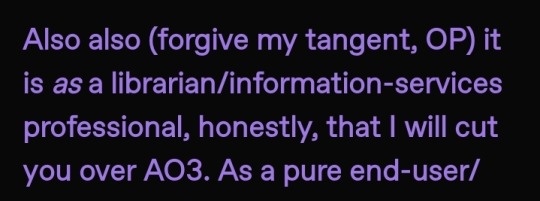
[image ID: screenshot of a different post where the writer says "Also also (forgive my tangent, OP) it is as a librarian/information-services professional, honestly, that I will cut you over AO3..." end ID]
...yall should have been listening in class instead of reading 200k a/b/o mpreg onedirection fanfiction and then maybe ud have a fucking clue as to why cutting libraries is a monumentally stupid idea.
collection development and management is a complicated thing -- something that requires constant surveying and reflection and education and both libraries and ao3 have a history of harmful materials in their collections. but, only one of these institutions have listened to the concerns of their communities and is actively making changes to mitigate harm and i can tell u that its not fucking ao3.
#sorry mutuals for this i know all of u agree and understand but i flew into a rage.#dac.doc#long post#cp mention#lt
1 note
·
View note
Text
Quitting While on Top (Peter Singer in Project Syndicate)
New Zealand Prime Minister Jacinda Ardern’s decision to resign, despite the support of a solid parliamentary majority and no challenge from within her party, stunned the world. Getting to the top of a worthwhile activity is an exciting challenge, and overcoming challenges can be enjoyable, but staying there is a different matter.
MELBOURNE – Last month, Jacinda Ardern, New Zealand’s 42-year-old prime minister, resigned her office, despite the support of a solid parliamentary majority and no challenge to her leadership from within her party. New Zealanders have to go back only six years to find a precedent. In 2016, John Key surprisedeveryone when, at the age of 55, he made way for his deputy to take over.
A year ago, Ashleigh Barty became the first Australian to winthe Australian Open in 44 years. She was 25 years old and the top-ranked women’s tennis player in the world for more than 100 weeks. Two months later, she announced her retirement. Likewise, Björn Borg, the Swedish tennis champion, retired in 1983 at the age of 26, and Anthony Kim, a rising star of golf, was also 26 when he stopped playing competitively.
Why do they do it? Borg and Barty have given similar reasons. At first, Borg said, he had enjoyed playing and achieving the goals he set for himself. By the time he retired, however, the fun had gone out of playing tennis at that level. “Basically, over the years, I was practicing, playing my matches, eating, and sleeping,” he said. “But there’s other things besides those four things.”
Barty announced her retirement in a video conversation with her friend and former doubles partner, Casey Dellacqua. Tennis, she said, “has given me all of my dreams, plus more, but I know that the time is right, now, for me to step away and chase other dreams, and to put the rackets down.” Her happiness, she continued, had ceased to depend on her results on the tennis court, and she no longer had the physical drive or the emotional desire to continue to challenge herself at the very top level. “It’s important that I get to enjoy the next phase of my life as Ash Barty the person, not as Ash Barty the athlete.”
In announcing her resignation, Ardern expressed similar feelings. It had been, she said, “the most fulfilling five and a half years” of her life. But “I know what this job takes,” she added, “and I know that I no longer have enough in the tank to do it justice. It’s that simple.”
Getting to the highest level of a worthwhile activity is an exciting challenge, and overcoming challenges can be enjoyable; but staying at the top as long as one can is a different matter. As Borg said, there are other things in life than tennis, and that is true of life in politics as well.
The Harvard Study of Adult Development has tracked the lives of some of its research subjects for more than 80 years, seeking answers to what makes them happy and healthy. Some of its results have just been released in The Good Life, by Robert Waldinger and Marc Schulz. Although any one-word answer to such questions is bound to be an oversimplification, the authors nevertheless are prepared to say that the key to both health and happiness is good relationships.
Almost everyone who retires says that they want to spend more time with their family. Sometimes, of course, that is just a cover for less honorable reasons for quitting; but in the case of Ardern and Barty, it was probably an important factor. Ardern was just the second prime minister – after Pakistan’s Benazir Bhutto – to give birth while in office. She has occasionally shared moments with her child on social media, but she will now be able to spend more time with her daughter, and her partner, who has been a stay-at-home dad. For Barty, the desire to become a mother may have played a role, for she is now pregnant with her first child.
Social norms are changing our ideas about a good life. We are paying more attention to work-life balance than we used to do, and rightly so. We are far more open than we used to be about mental health – footballers now acknowledge facing mental-health issues, something that previously would have been considered humiliating. More people are recognizing that career success is not to be equated with living a good life. We should also ask what our career is doing for the world. Perhaps there are better things we could be doing. The website 80,000 hours has some suggestions.
Not everyone can choose to change the course of their life. Some face limited employment opportunities, with few options if they are to continue to feed and house themselves and their dependents. Political leaders may be reluctant to leave office because they believe they can do more good than those who will replace them.
When that belief is well-founded, rather than a form of self-deception fueled by the addictive nature of power, as it often is, staying in office may be what they should do. The rest of us, however, have choices, and we should frequently be asking ourselves if we are living the best life we can – both for ourselves and others.
1. https://www.project-syndicate.org/commentary/jacinda-ardern-not-alone-quitting-at-the-top-by-peter-singer-2023-02
0 notes
Text
Day 29,
Feeling better this morning. Amazing how sleep helps with existential dread. Although I do always get thrown through a bit of a loop waking up in the archive instead of the house.
*******
Cass was waiting outside the front door when I opened up the library for the day. It’s easy to sleep in with there being no windows in the archive or its hidden bedroom, and that’s not normally a problem since I end up opening around the same time I would get in from the outskirts. But when your new assistant is used to getting up at the crack of dawn for farm work… well, that’s a scheduling concern we probably should have thought about. Next time we’re both spending the night in town I should probably at least leave the front door unlatched. Maybe find out if there’s a second archive key I can get her.
I apologized for keeping her waiting, she played it cool like it was no big deal and made a joke about old folks needing their rest. I assured her I’m not that old, and for all we know I’m only a month old. A comeback that I immediately regretted due to the obvious invitation of child and baby jokes. Especially with her being here to teach me to read.
And so we spent the rest of the morning with me learning the alphabet. It’s an incredibly weird feeling to be able to glance at complete sentences and know what they say but to not recognize any of the individual letters when presented with them in isolation or know what sounds they make. The worst part is that dichotomy doesn’t even make logical sense. At least the alphabet is a phonetic one. That at least is a concept I can grasp well enough that I suspect my “previous” language was as well.
On the note of my… impairment… not making sense there were a few times where I was worried that Cass thought I was faking it, but when I said as much to her she just shrugged and said that she’d always heard outsiders were weird like that (not this issue specifically, just that “sometimes they don’t work the same as everyone else’). She found it to be more intriguing mystery to solve than annoyance. It’s funny how her demeanor changes when she’s actively working on helping someone with a task, whether it’s unloading a wagon, setting up her family’s market stall, or teaching basic literacy. The usual smug, know-it-all brat gives way to a child who genuinely cares about being helpful and wants to be seen as doing a good job. It’s only when the task is done, and she knows she’s done well or shown someone up that the initial side of her comes back to the fore. And then there’s the unbridled wonder and excitement when she’s exploring a new place or seeing a new sight. It’s almost hard to reconcile the kid laughing and running around the cathedral ruins with the one giving her signature look of superiority with the one patiently teaching the names and sounds of letters. It’s tempting to call one or another a facade or mask, but that feels like an oversimplification.
I’m rambling now. Point is, kids are people too. Don’t write them off as one-dimensional just because they’re young. Everyone has multiple faces if you look long enough to see them in different situations, and that’s not a bad thing.
Okay, still rambling. Stop that. It seems that the alternative reaction to existential dread in the face of cognitive weirdness is waxing philosophical about everything you come across.
From the alphabet (which I’m still going to need to practice to memorize enough to teach it to kids come rainy season) we moved onto individual words. Those I seem to be able to handle well enough that we went ahead and started focusing on sentence structure and grammar. Probably a little bit advanced for kids just learning to read and write, but at this point I think it was more about figuring out what I can and can’t easily process. As previously established, if I try reading a whole sentence all at once it’s fine, but it seems that if I start concentrating on isolated fragments of sentences something about the structure and word ordering is slightly off from what I’m reflexively expecting and I start getting a headache.
We were still dealing with how to work through that when we realized it was late enough to be meeting back up with Cass’s family for the ride back to the outskirts. Fortunately, there weren’t any visitors to the library today so lessons could go uninterrupted and we didn’t have to answer awkward questions about why the Archivist was practicing letters. I suspect that’s going to be the majority of Cass’s assistant days for the near future rather than helping regular archivist work. Not what either of us were expecting, but necessary if I’m going to be trying to teach it myself to even younger kids later on.
Still, I should probably try to plan another exploration trip to take her along on. Those seemed to be what she really wanted out of this. And I’d be lying if I didn’t have my own growing itch to explore. Maybe invite Lin again too. The two of them seemed to get along well enough and it’d be nice to have another adult around.
*******
How old am I? I can’t remember a specific number of years before arriving at the Village, but I have this perception in my head of “adult, but still young”. Or at least not old. The fact that I suspect my whole body is different confuses matters even further. Comparing the look of my reflection to the people around me, I’d guess I’m of a similar age to Vernon and Lin. Definitely younger than James.
<==Previous Next==>
#daily writing#serial fiction#original fiction#writing#epistolary novel#writers on tumblr#sliceoflife#original prose#fiction#creative writing#literature#prose#writers#web novel#webnovel#novel#journal#isekai#epistolary#fantasy#slice of life#words#my writing
1 note
·
View note
Note
I understand you like villains, but the Darkling is a manipulative and abusive person who doesn't care about Alina. He only wants to use and enslave her. Even the small nice things he does are manipulation. Their ship isn't healthy. Alina belongs with Mal.
look, the darkling is a thousands of years old ethereal being who almost completely lost any form of attachment to his humanity, being completely lost in the rivers of time and of his own devouring power, with the sole exception of a loosely defined sense of patriotism (which is filtered by altered, almost god-like morals that cannot be understood nor can apply to normal human beings), and his recognition in alina of his only equal mate, his only place of belonging in endless oceans of solitude, recognition that deeply unsettles and enrages him at first (after all she is an oblivious child and he an ancient superhuman), but that he’s too mature and intelligent not to accept and respect in earnest in his own way.
so, saying that he doesn’t care about alina and that he’s only there to play with a naive girl’s head to obtain her power, is nothing but sheer oversimplification and lack of understanding of his character.
of course he constantly manipulates her, he’d manipulate reality itself given the chance, that’s the way he navigates the world, through power, coldness and charisma. i think it’s quite obvious he thinks best being in control of everything important, he is the one having the bigger picture after all, he’s everything he has ever had since remote times, he’s been alone in his godly point of view for thousands of years, it’s only natural he thinks his agenda and opinions superior to those of a bunch of children (the king himself to him is but a child). in his eyes, he is the centuries-old man and she is but a precious little girl in whose hands the very reason of his every battle and hope is being placed by fate. his succeeding in having her power by his side is capital for him, after all his ambition and distance from humanity is endless, and so is his desperation. that’s why he opts for the most effective way to ensure having it (putting the collar on her, being sure to be in control and not subjected to the whims of a teenager). honestly, from his point of view, this is simply mere logic and effectiveness, nothing particularly evil or personal. let’s not forget he was hoping all along she would join him willingly.
yet, leaving aside the political agenda, the very fact that he does take the time to “manipulate” alina, that he cares enough to spend himself, the detached uncaring god, to try his best to be liked by her, to be admired and somehow understood by her, even to confess himself in his own subtle way full of half-truths, is the proof that he does care for the person behind the power he so much craves. there’s literally no pragmatic reason to charm someone you already have de facto captive in your own guarded palace and that you plan to enslave, if you don’t somehow crave her attachment. she fashinates him, she unsettles him. she reminds him of who he used to be. what we perceive as manipulation is his immoral and very wrong way of caring. he probably believes she would never love the real him, he probably thinks she would flee screaming. and, honestly, he wasn’t that wrong after all.
yet he craves and he tries to touch this light from his abyss of darkness, he’s anything but cold indifference. his manipulation probably wants to have many different effects on alina, that don’t necessarily exclude one another. one simple act of manipulation can have the aim to secure her trust in order to claim her power more easily and can at the same time aim to make her simply smile. these two facts can peacefully coexist in such a man’s mind. the first doesn’t make the second less real or important.
asking mal for her favorite flowers and then giving them to her himself can be a way of charming her and can be a way to literally give her her favorite flowers. It’s undoubtedly a petty move, yet very effective and even somehow funny if we shed the very popular woke indignation. it’s something very childish and very human to do. this is not so much political scheming as it is kindergarten rivalry, if we are honest with ourselves. in the darkling’s mind, the end always justifies the means and the evil plan behind giving alina her favorite flowers stealing the information from her sweetheart or reading their letters, is being able to get to her heart in the easiest way possible, disregarding every rule because he thinks himself above them all.
i’m honestly astonished adults don’t seem able to understand that the darkling wanting alina’s power and aiming to be in control of it, having his way in everything, and the darkling loving her are not only compatible truths but also in many ways codependent ones.
and how lame constantly labeling every unusual relationship “unhealthy” as if that would immediately rule out their right to beauty or complexity. especially in fiction, adults should have the right, the agency, to have their disgustingly unhealthy relationships in peace, without moralists constantly trying to diminish what they share because of it. the majority of fascinating things in art and in life are unhealthy. grow up. the women in these relationships are not fragile little flowers, they can deal with abysmality, they can even enjoy it. you are taking their choice and their own complexities away from them.
and really, in this very case don’t even have me started with mal. his love confession at the end of shadow and bone was cringe-worthy. “now i see you, alina”. like literally this boy fucked everyone that moved but alina, who lived for him and who clearly needed help because she was literally rotting away, and yet he didn’t even know she existed until she became important and famous, then proceeding to shame her for it in the little palace, only in the end to confirm his shallowness by saying “now that you are basically a goddess personified i see you”, and she is even supposed to deeply appreciate that? seriously? is this the healthy love you want women to lower their heads to? not to mention the only thing that keeps that love barely lukewarm is alina’s childhood trauma and obsessive attachment to the only person who was with her during those hard times. what a fairy tale.
in short, nothing wrong in having banal points of view, to each their own i suppose, but i’d appreciate if you’d avoid coming in other people’s inboxes acting like the moral artistic police when you clearly even lack the means to do it. thank you.
#shadow and bone#the grisha trilogy#the darkling#darklina#books#anon#one and one thousands stories lis told#villains
482 notes
·
View notes
Text
Wonder Egg Priority Episode 4: Boys’ and Girls’ Suicides Do Mean Different Things (But Not in the Way the Mannequins Want You to Think!)

So, let’s talk about this for a second. After I got over my initial knee-jerk reaction, I realized I wasn’t sure how to make sense of exactly what the mannequins were arguing for here. So let me rephrase their statements to make the argumentative structure more explicit: Because men are goal-oriented and women are not, because women are emotion-oriented and men are not, and because women are impulsive and easily influenced by others’ voices and men are not, boys’ and girls’ suicides mean different things – girls are more easily “tempted” by death, and therefore, more likely to require saving when they inevitably regret their suicide. While Wonder Egg Priority, so far, seems to agree with the vague version of the mannequins’ conclusion, namely that boys’ and girl’s suicides mean different things, it refutes the gender-essentialist logic through which that conclusion was derived.
The mannequins choose a decidedly gender essentialist approach in explaining the difference between girls’ and boy’s suicides; they argue that the suicides are different because of some immutable characteristic of their mental hard wiring (in this case, impulsivity, emotionality, and influenceability). Obviously, this is a load of bull, and Wonder Egg Priority knows it. The mannequins are not exactly characters we’re supposed to trust, seeing that they’re running a business that is literally based on letting these kids put themselves in mortal danger. As faceless adult men, they parrot and possibly represent the systems that force these girls to continue to be subjected to physical and emotional trauma (it’s probably more complicated than this, but four episodes in, it’s hard to say more). So, we’re probably supposed to take what they say with great skepticism. Also, the director, Shin Wakabayashi, has recently said that in response to these lines, Neiru was originally going to object, “When it comes to their brains, boys and girls are also the same,” (which unfortunately is not exactly true and is somewhat of an oversimplification, but the sentiment is there). While that line ultimately did not make it in, Neiru does reply with a confused and somewhat indignant, “What?!”, a reaction that gets the message across. Neiru is not a fan of gender essentialism, and as a (more) sympathetic character, we’re supposed to agree with her.
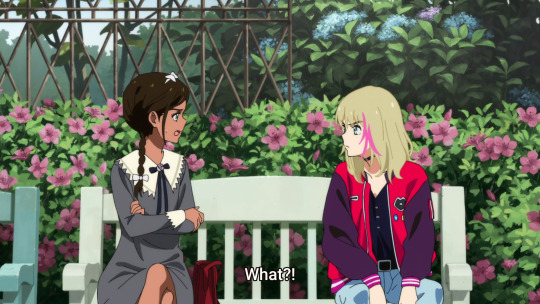
That is, the differences between boys and girls is not something inherent to their biology or character, but something constructed by culture and experience. This rejection of gender-essentialism is apparent in Wonder Egg Priority’s narrative, which takes a more sociocultural perspective on the difference between boys’ and girls’ suicides. It says, well of course boys’ and and girl’s suicides don’t mean the same thing, that’s the whole reason why we’re delving into the experiences specific to being a girl (cis or trans) or AFAB in this world – to show you how girls’ suicides are influenced by systems of oppression perpetuated by those in power (ie. the adult, in this specific anime).
And all the suicides we’ve seen up until now tie into that somehow. For instance, Koito is bullied by her female classmates who think that Sawaki is giving her special treatment. This is a narrative that comes up over and over again, in real life as well: that if a young girl is being given attention from an older man, then it’s her fault – that she must want it, or at least enjoy it somehow, and that it signifies a virtue (eg. maturity or beauty) on her part. And if Koito is actually being given such treatment by Sawaki, an adult man in a position of power over her, that is incredibly predatory.

And we all know that child sexual abuse is something that overwhelmingly affects girls, with one out of nine experiencing it before the age of 18, as opposed to one out of 53 boys (Finkelhor et al., 2014). Regardless of whether Sawaki was actually abusing Koito or if the students only thought that he was, Koito’s trauma is ultimately the result of this romanticized “love between a young girl and adult man, but not because the man is predatory, but because the girl has some enviable virtue that makes her desirable” narrative. Similarly, in episode 2, Minami’s suicide is driven by ideas related to discipline and body image in sports, which while not necessarily specific to female and AFAB athletes, is framed in an AFAB-specific way. For instance, take the pressure on Minami to “maintain her figure”. Certainly, male athletes also face a similar pressure, but we know that AFAB and (cis and trans) female bodies are subject to closer scrutiny and criticism. We know that young girls are more likely to suffer from eating disorders. And Wonder Egg Priority situates Minami’s experience as decidedly “about” AFAB experience when her coach accuses her change of
figure due to her period as a character failing on her part.

Likewise, episode 3 delves into suicides related to “stan” culture, this fervent dedication to celebrities that is overwhelmingly associated to teenage girls. And Miwa’s story, in episode 4, explicitly shows how society responds to sexual assault. When Miwa does have the courage to speak up about her assault, she’s instantly reprimanded by basically everyone around her. Her father is fired because her abuser was an executive of his company. Her mother asks her why she couldn’t just bear with it, telling her that her abuser chose her because she was cute, as if that’s supposed to make her feel better about it. Wonder Egg Priority shows that this sort of abuse is a systemic problem, a set of rules and norms deeply engrained in a society and upheld by all adults, regardless of gender, social status, or closeness (to the victim). Wonder Egg Priority says that, yes, girls’ and boys’ suicides have different meanings, but it’s not due to some inherent difference between the two, but the hostile environment in which these girls grow up. Girls are not more easily “tempted” by death, they just have more societal bullshit to deal with.
But Wonder Egg Priority goes further than just showcasing how girls’ (and AFAB) experiences are shaped by sociocultural factors. The story also disproves the supposedly dichotomous characteristics that the mannequins use to differentiate girls and boys (i.e. influenceability/independence, impulsivity/deliberation, emotion-orientation/goal-orientation). If the mannequins are indeed correct, and that girls are just influenceable, impulsive, and emotional, you’d expect the girls in the story to be to be like such too. Except, they aren’t. Rather, they’re a mix of both/all characteristics. This show says that, certainly, girls can be suggestible, but they’re also capable of thinking for themselves. For instance, when Momoe asserts her own identity as a girl at the end of episode four, she rejects the words of those around her who insisted that she isn’t a girl. If she were as suggestible as the mannequins believe her to be, that would never have happened – she would have just continued believing that she wasn’t girl “enough”. But, she doesn’t because she is equally capable of making her own judgements. Likewise, Wonder Egg Priority shows that girls can be impulsive, but they can also be deliberate and pre-mediating. When Miwa tricks her Wonder Killer into groping her to create an opening for Momoe to defeat it, she’s not doing it out of impulse – it’s a pre-mediated and deliberate choice unto a goal. And Wonder Egg Priority continues, girls can be equally emotion oriented and goal oriented. Sure, the main girls are fighting because they have the goal of bringing their loved ones back to life, but those goals are motivated by a large range of emotions, from guilt to anger, grief, compassion, and love.
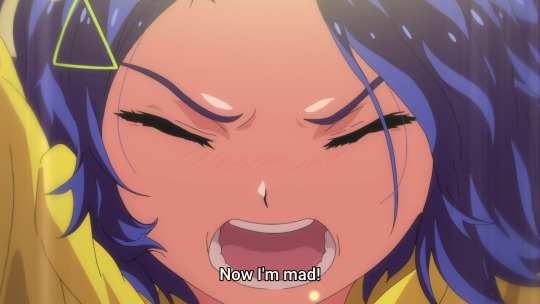
Being emotion-driven doesn’t mean you’re not goal-driven, and vice versa. In fact, in this case, being emotional drives these girls toward their goals. In other words, none of these traits that the mannequins listed are either “girl traits” or “boy traits”. Being one does not mean you can’t be the other, even if they seem dichotomous at first. Wonder Egg Priority’s diverse cast of multi-dimensional female characters allows it to undermine the mannequins’ conceptualization of gendered roles, refuting the idea that these (or any) character traits should be consider gendered at all.
As an underdeveloped side thought, I think Wonder Egg Priority’s blurring of gendered roles is also well-reflected in its style. There’s been a lot of talk about whether Wonder Egg Priority constitutes a magical girl series, and I think that’s an interesting question deserving of its own essay. Certainly, it does follow the basic formula of the magical girl story: a teenage heroine ensemble wielding magical weapons saves the day. But it also throws out a lot of the conventions you’d expect of a magical girl story – both aesthetically and narratively. Aesthetically, it’s probably missing the component that most would consider the thing that makes an anime a magical girl anime: the full body transformation sequence, complete with the sparkles and the costume and all that. Narratively, the girls are also not really magical girl protagonist material – they’ve got a fair share of flaws, have done some pretty awful things (looking at Kawai in particular; I still love you though), and aren’t exactly the endlessly self-sacrificing heroines you’d expect from a typical magical girl story. On the other hand, the anime also borrows a lot from shonen battle anime. We get these dynamic, well choreographed action sequences full of horror and gore, the focus on the importance of camaraderie between allies (or “nakama”, as shonen anime would call it) exemplified through all the bonding between the main girls during their downtime, and in the necessary co-operation to bring down the Wonder Killers. That said, this anime is not a shonen; the characters, types of conflicts, and themes are quite different from those that you’d find in a typical shonen. The bleeding together of the shonen genre and the magical girl genre, at the very least (and I say this because I think it does way more than just that), reflects Wonder Egg Priority’s interest in rebelling against conventional narratives about girlhood and gender.
#wonder egg priority#wonder egg priority analysis#wep#w.writing#my writing#anime analysis#analysis#anime#w.analysis
527 notes
·
View notes
Text
Cats 101: What the Fuck Even Is This Thing?
So, my old Explaining Cats post just went through a new wave of popularity, including with people who haven’t seen Cats before. This has inspired me to do a series of posts explaining Cats a bit more clearly, just in case someone’s curious about it, but also scared to go near it because it’s weird. This might make it a bit less scary.
So, the story of Cats begins a long time before it actually begins. In 1939, a poet by the name of TS Eliot published a book of poems for children, all about various silly cat characters. This was Old Possum’s Book of Practical Cats. It was read by and read to a lot of children, because TS Eliot was thought of as a poetry god at the time.
Anyway, one of the children who grew up with these poems was Andrew Lloyd Webber. In the late 1970s, he started setting the poems to music as a passion project. He decided that the results would make for a good stage musical, with people singing and dancing to what was basically a concept album, at this point. He had no idea for any sort of plot for this musical, not thinking that it needed one.
To make his surreal dream a reality, ALW teamed up with several other people who thought the idea was cool, but were slightly more sane about the whole thing. Trevor Nunn, the director, decided that there needed to be at least a small amount of plot so the audience would find some point in the whole thing. These were children’s poems and children might not care, but this musical wasn’t being aimed at children. ALW was inspired by Hot Gossip, which meant weird and horny. Eliot’s widow signed off on it, claiming that he would’ve liked that. Knowing what the man was actually like, I assume that this was some sort of revenge for a shitty marriage.
Anyway, plot. Eliot’s widow gave The Team access to some unreleased poems. There was a poem that Eliot wrote for Old Possum’s that he decided not to include because it was too sad for children, called Grizabella the Glamour Cat. The Team decided to make this the plot.
The show was about a tribe of cats that called themselves Jellicles. The word Jellicle is thought to come from one of Eliot’s child relatives mispronouncing “dear little”. Jellicle cats are “dear little cats”. However, this actually isn’t important, because in the context of the play, Jellicle doesn’t mean anything. It’s just what these cats called themselves. It’s a proper noun.
The Jellicle tribe meets once a year at an event called the Jellicle Ball. At the Jellicle Ball, after doing some regular ball stuff like singing and dancing, Old Deuteronomy, the leader of the tribe, chooses a cat to go to The Heaviside Layer. A cat who goes to the Heaviside Layer is reborn and returns to Earth with a new life. This comes from the idea of cats having nine lives. This is how they do it. At the end of one life, they go up to the Heaviside Layer and get a new one.
This is why some people say that Cats is about a death cult. They’re not completely wrong, but it’s an oversimplification to say the least.
So, all these cats take turns singing about themselves and each other. Before Grizabella’s plot was really established, these were “auditions” for the Heaviside Layer. But, later on, that was only the case with some of the numbers. Some of the characters with songs are pretty young and/or really happy with their lives, so the Heaviside Layer makes no sense as a motivation for them. Instead, they’re justing having a good time or reminding everyone how awesome they are.
But, there’s this one cat, Grizabella, who used to be one of the tribe’s star performers, who, for some reason or another, left the tribe and is not allowed to return. She keeps showing up and being treated like an outcast until the very end when she sings her song. She actually has two. During her first appearance, we get Grizabella the Glamour Cat, a song about who this weird sad lady is. At the end, Grizabella sings Memory, longing for the old days, revealing just how miserable she is and that all she wants is to be part of a family again. Everyone is moved, they accept her, and she’s rewarded with the Heaviside Layer, symbolizing the tribe giving her a second chance.
So, now there’s a plot. It’s time to figure out how people are supposed to dance to it.
Since the poems themselves were not designed to tell a story and are all just character descriptions, the usual way that musicals tell stories isn’t possible. Only a handful of songs have original lyrics. This mostly consists of Memory and songs related to it. The rest of the story, since the lyrics don’t tell a story, is told through the choreography. 90% of Cats is more ballet than typical musical theatre. Said ballet was choreographed by Gillian Lynne and, since 90% of the story is told through dance, 90% of the story came from her. In many ways, Cats is actually her show.
So, when explaining what’s going on in this thing, expect to hear more about Gillian Lynne’s ideas than Andrew Lloyd Webber’s. He wrote a concept album and hired other people to make it into an actual musical. Give Webber credit when the music sounds good.
After improvising a good amount of the show during rehearsals, Cats was officially on in West End in 1981. It was a big success, so Broadway naturally had to have it, and the show opened there a year later. Then it was everywhere.
Jumping ahead to 1997, The Team realized that the show probably wouldn’t run forever. Cats had just become the longest-running show on Broadway, but it wasn’t nearly as big as it was in the 80s when Cats was The Big Thing in musical theatre. If the show closed in theatres, future generations couldn’t see it. Now, it was decided to produce a special recorded version for VHS, which was released in 1998. This is the most accessible and well-known version of the show. If you want to see it, it’s best to start there. Most of what I’ll say about the show in future installments is based in that version.
Next Time: Who Are All These Goddamn Cats?
21 notes
·
View notes
Text
Billie Eilish's New Album Makes Me Happier Than Ever
First real post - here we go!
TW: mentions of abuse
On July 30, Billie Eilish dropped her much-anticipated second studio album, Happier Than Ever, ushering in a whole new era of Eilish. Billie is bolder than ever before. Frankly, she’s bolder than almost anyone else in the music industry right now. I listened to the album in its entirety on the day it dropped, and the thought I kept having was, “Billie’s out for BLOOD,” which doesn’t sound very intelligent or journalistic, I know. But truthfully, there is almost no difficult topic that goes unaddressed on this album. And, in true Eilish fashion, everything is handled with powerful, poetic grace. Eilish and Finneas (her brother, best friend, songwriting partner, and producer) crafted songs about everything from stalkers to body image to abusive relationships to unrealistic portrayals of women in pornography. This is an oversimplification of the album’s themes, but these are topics which stand out as the most striking, simply because they are so commonly avoided or mishandled in modern media. At only nineteen years old, Billie Eilish is re-shaping the norms and standards of her industry for the better. She gives me nothing but hope for the future of music, and art as a whole. This is my personal ranking of my favorite songs on Happier Than Ever, based purely on taste. Every song has a special place in my heart, and I connect with each in a different way, but for this list, each track is listed in an order based on how much I love it.

16. Everybody Dies
“Everybody Dies” felt a little flat to me in some respects. A few lines stood out as profound, such as, “It's just a lot to think about the world I'm used to/ The one I can't get back, at least not for a while/I sure have a knack for seeing life more like a child.” Otherwise, the song is basically just Eilish pondering death and the overall idea of losing things, such as the quieter, pre-fame lifestyle mentioned in the line quoted above. It fits with the other themes of the album, but it doesn’t shine quite as much as the other songs. However, I will give her and Finneas credit for their unconventional songwriting style: this song has four verses and no chorus. Even though this one isn’t my favorite, the music is still lovely, and they totally managed to pull of the unorthodox lyrical arrangement.
15. Male Fantasy
Lyrically, this song didn’t feel quite as strong as some of the other songs. But I appreciate how it starts off with Eilish calling out unrealistic depictions of women in porn, an industry infamous for catering to the satisfaction of male viewers, hence the name “Male Fantasy.” This idea connects to the larger meaning of the song: Eilish is coming to a disheartening realization about the superficiality of pornography, while simultaneously coming to a disheartening realization about the difficulties of moving on from someone. This song feels a little unexciting to me, but maybe that’s intentional. When we’re hurting, we use coping mechanisms that don’t always make sense to other people, or even seem boring to others. Eilish has said vulnerability is a big theme on this song, and maybe that’s also the point: she’s the one feeling vulnerable, not me, so it doesn’t matter if I enjoy it. It’s her moment, not mine. And I'm cool with that.
14. Halley’s Comet
This felt to me like a very basic love song, and Billie is far from basic. The song is named for a comet that is visible from Earth every 75 to 76 years. She sings, “Halley’s Comet comes around more than I do,” which is a play on words. “Comes around” means to physically visit, and also to change opinions. The song focuses on Eilish having trouble accepting her feelings for someone, while also acknowledging that she doesn’t physically spend much time with this person. I feel like the metaphor in this song could have been developed further. Eilish has shown her strength with extended metaphor in the past (see “strange addiction” and “all the good girls go to hell”), and I wish we’d gotten more in-depth usage of the comet metaphor. But that piano bit near the end is magnificent.
13. Your Power
The message of this song is undeniably important. There are far too many songs glamorizing adult men having relationships with underage girls (I have news for KISS and The Knack: pedophilia is never rock ’n roll). I think Eilish is a trailblazer for flipping around the narrative and giving the victim a voice. She switches perspectives throughout the song, sometimes singing from the viewpoint of a spectator, sometimes recalling her own experience. This ensures the emotional investment of all listeners, whether they are victims themselves or simply feel empathy for victims. Once again, I find this song groundbreaking. The only reason it has a slightly lower rating is that I sometimes find it harder to get into, but that’s just because it’s a slower song. That’s not a fault of the music - that’s just me being overactive and wanting to dance. This isn’t really a song for dancing.
12. GOLDWING
This song is about a young woman - the “gold-winged angel” - who has yet to be traumatized or exploited in life. Eilish once again brings up the vicious nature of celebrity culture and abuse when cautioning her subject about the cruelty of the media, or just life in general. Eilish considers her subject “sacred” - this person is lovely and genuine, and Eilish fears these traits will make it easier for others to manipulate her. The feeling of this song is angelic and hymn-like, which really helps to drive its meaning home. The message, musical style, and lyrics are all very solid.
11. Oxytocin
This song is so intense, I love it! Oxytocin is sometimes called “the love hormone,” as it’s released during various sexual and reproductive activities. Eilish claims to “need” her lover for this hormone, and describes feeling very possessive of this person - her passion borders on violent. Considering that women are typically depicted as meeker and more submissive in romantic relationships, I liked seeing Eilish channel her dominance and ferocity. And, she refers to God using female pronouns (iconic), as well as saying that She would want to get involved in the romantic activities of Eilish and her lover. Billie knows she’s hot. Good for her.
10. Not My Responsibility
9. OverHeated
I know, technically “Not My Responsibility” isn’t a song, it’s more like spoken word poetry. It was first shared as a visual and musical interlude on the world tour for When We All Fall Asleep, Where Do We Go?. I think it was a brilliant choice to include it on the album, with a seamless transition into OverHeated. Both address the toxic and impossible beauty standards placed on women. Eilish discusses the controversy around the baggy, shapeless clothes she used to wear to hide her body and save her from judgement, remarking on how she would probably be judged no matter what she wore. OverHeated pertains more to an incident in which paparazzi captured a picture of Eilish in a tank top, and the internet immediately labeled her curvy figure as “fat.” These two tracks contain some of the most powerful lines regarding body image I’ve ever heard - especially concerning celebrities’ bodies. In “Not My Responsibility,” she says, “The body I was born with - is it not what you wanted?” In OverHeated, she points out, “And everybody said it was a let down/I was only built like everybody else now.” Eilish seems to come to the important realization that there may be no satisfying people. Someone will always have something ugly to say about your body. But with these two tracks, Eilish establishes a boundary: she’s distancing herself from the negativity, and she’s learning not to care what everyone else thinks.
8. Lost Cause
This is truly such a fun song. The music video is iconic. I’m honestly offended that I didn’t get invited to that slumber party. I love how this song balances addressing relationship issues while being super playful. She’s ending the relationship, she’s calling her partner out on their BS, but she’s having a lot of fun while doing so. The bluesy music only adds to the sass. It’s the ultimate “you-weren’t-good-enough-for-me-anyway” song.
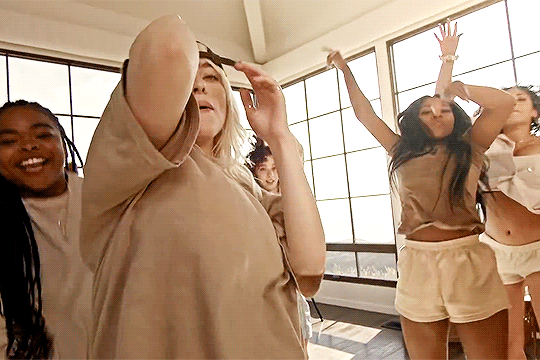
7. Billie Bossa Nova
First of all, I’m a sucker for alliteration, so naturally, I’m quite fond of this song. “Billie Bossa Nova” marks a more mature shift in Eilish’s music as she discusses a new relationship, singing about “that heavy breathing on the floor” and wanting to "make a movie…that we'd have to hide.” But, as always with this album, themes of celebrity are brought in as she describes using “different names at hotel check-ins” and how “nobody saw me in the lobby, nobody saw me in your arms,” revealing her intention to keep this relationship fairly private. This song, paired with Billie’s British Vogue issue, in which she wore a variety of pink and tan lingerie, marks her fully embracing adulthood and the sensuality that comes with it. We stan a queen who owns her sexuality!
6. NDA
5. Therefore I Am
I HAD to put these two songs next to each other; they are inseparable. The transition is flawless, and it gave me chills the first time I heard it. First, she reckons with the more personal struggles of fame, such as legal documents preceding hookups, stalkers, and overbearing paparazzi. Next, "Therefore I Am" takes a broader look at fame - it delves more into Billie’s relationship with the public and other celebrities. Recently, the news has been filled with discussion of parasocial relationships, thanks to John Mulaney’s fans’ shock at some of his recent behavior (parasocial relationships are a fascinating concept - I would recommend reading a few articles about it). I feel like "Therefore I Am" touches on parasocial relationships, even among celebrities. Everyone thinks they know a celebrity, when we don’t - we only know the image he/she/they present. Just because you are a fan doesn’t mean you are a celebrity’s friend. Eilish vents this frustration in “Therefore I Am,” named for the philosophical phrase, “I think, therefore I am,” which states that just being able to contemplate existence means one actually does exist. In the context of the song, Eilish refutes the assumption that admiring her and her music is enough to establish a friendship. Yet again, a profound and refreshing message. And I think I need to get the line, “Get my pretty name out of your mouth,” tattooed on my body, ASAP.
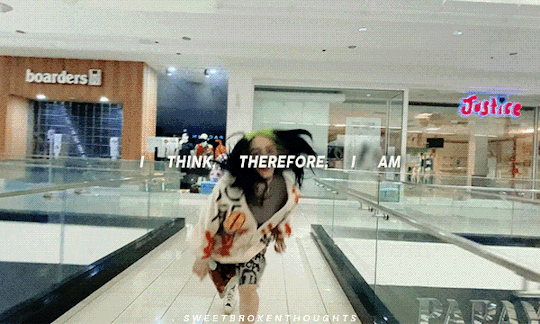
4. my future
Honestly, this might be one of the most gorgeous songs she’s ever written. The message is truly perfect. This is the song any lonely person, heartbroken person, or person on the verge of adulthood needs to hear. I think it’s a crime that there aren’t more songs that impart the importance of the relationship one has with one’s self - after all, that’s a relationship you’re going to have for the rest of your life!
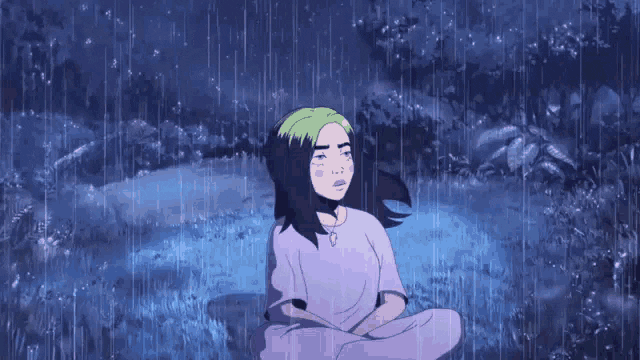
3. I Didn’t Change My Number
Am I biased because I just got out of a relationship that occurred primarily over text? Yes. Yes I am. But, I love how confident Eilish is in this song. She knows she hasn’t done anything wrong. She knows she’s making the right choice by breaking off the relationship. She knows her ex-lover is clingy and overly demanding. This is an excellent moving-on song. I also love how to mentions her manager and best friend by name, because, y’know, women supporting other women in the face of awful men warms my heart. There’s also a part towards the end of the song when she sings, “Maybe you should leave/Before I get too mean/And take it out on you/And your best friend, too.” The last line is sung in this funny, higher-pitched voice, and I always get a huge kick out of it.
2. Getting Older
When Billie sang the opening lines of this in her Disney+ concert (more on that below), I honestly almost cried. This song is stunning. The lyrics are straightforward but reflective. The music is soft - not enough to get lost in the background, but just enough to provide gentle but un-distracting ambience for Eilish’s thoughtful singing. This song means a lot to me, because it feels like many of the internal conversations I’ve been having with myself lately. Very wise choice for an opening track.
1. Happier Than Ever
Without a doubt, this is my favorite song on the album. It feels like a marriage of some of her old musical styles and new techniques. It starts with a guitar or ukulele that we heard so much of in her first two albums, and then transitions into a full-out rock anthem. I love that when the song begins, the slower, softer singing and music seems to indicate she’s feeling quite calm about the end of the relationship…but she quickly proves to still be furious and heartbroken when the drums and electric guitar kick in. This feels like such a realistic way to portray the end of a relationship. One moment, you’re fine. You’ve totally moved on, you’re completely over the other person - but if you think about it too long, you’re not fine. You still feel broken and angry inside. My favorite lyrics are, “I don't relate to you, no/'Cause I'd never treat me this shitty/You made me hate this city.” Those lines give me such an adrenaline rush. Once again, she brings up the idea of first and foremost loving yourself. And the idea of someone traumatizing you to the point where you despise an entire city is one of the saddest sentiments ever - especially considering how openly Eilish admits to loving Los Angeles. If I could only pick one song to save from the entire album, this would be it. This is an extraordinary song.
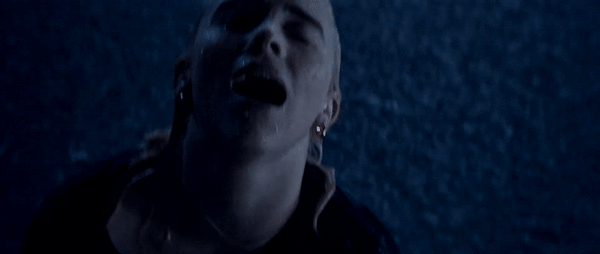
If you get the chance, check out Happier Than Ever: A Love Letter to Los Angeles on Disney+, a recorded, audience-less concert Eilish performed at the Hollywood Bowl. The Los Angeles Philharmonic Orchestra and the Los Angeles Children’s Chorus both make appearances, plus some other impressive musicians - and Finneas, of course! Some people called it underwhelming, but I found it genuinely enjoyable. It’s not the movie of the year or anything, but if you like Eilish’s music, it’s nice to watch her perform in a slightly more traditional concert setting after being deprived of almost anything resembling a concert for more than a year. If nothing else, watch it for the adorable animated Billie Eilish.
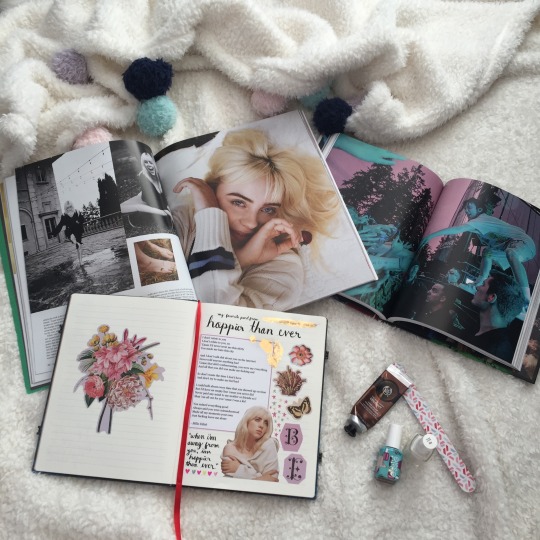
And, if you made it this far, your reward is this photo of my aesthetically arranged Billie Eilish paraphernalia! On the top left is the July-August issue of Rolling Stone, featuring Billie on the cover and in a wonderfully insightful interview. All the photos are gorgeous. Top right is a spread from her photo book, which I also highly recommend checking out. On the bottom is my Happier Than Ever page in my poetry journal! This song is super long, so I didn’t include the entire thing, just my very favorite verses at the end. And, I threw some nail stuff into the photo, because I always think of Billie when I’m doing my nails. She has really great nails. 💅🏻❤️
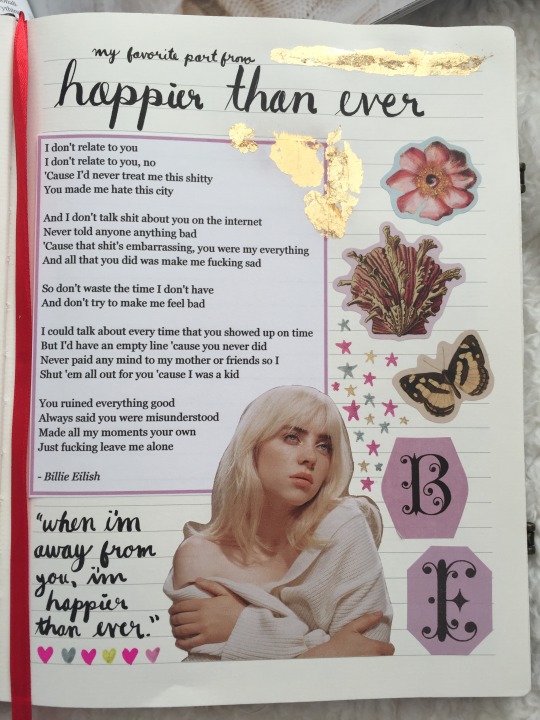
Closer look at the journal page ↑
Thanks for reading this monster of a post! I hope you enjoyed. And if any of these gifs belong to you, thanks for letting me use them! Feel free to give yourself a shoutout in the notes. Keep checking in for more awesome content this week!!
@NoLossForWords,
Katie
#billie eilish#finneas#happier than ever#getting older#I didn't change my number#billie bossa nova#my future#oxytocin#GOLDWING#lost cause#halleys comet#not my responsibility#overheated#everybody dies#your power#nda#therefore I am#male fantasy billie eilish#grammy winner#billie ellish lyrics#women in music#powerful women#music#lyrics#song lyrics#lyric quotes#my favorite songs#celebrity culture#bodypositivity#body image
42 notes
·
View notes
Text
Anon wrote: Hey. I'm INFJ. I want to ask about relationship problems. The relationship in question is between my ESTJ mother and I. Generally, I would describe our relationship as close and loving, but there is a conflict, and that came from our opposite ideology and political beliefs.
I want to say before continuing that we are neither American or European, so our ideology and politics shouldn't be understood from the "western" side of things, though to simplify by comparison, my views could be described as leftist and my mother's as conservative. I should also add that I used to hold her worldview when I was younger, but changed once I was old enough to form an opinion of my own. This caused my mother to imply many times in our discussions that I am "brainwashed" and dismiss me as "too young" and "too ideological". I should add that the latter (ideological) is a valid criticism. Still working on that.
Otherwise, I often tried to persuade, then later find middle ground with her, to no avail. We ended up arguing many times, until we decided to not talk politics with each other anymore. So, what's the problem, you might ask.
Recently, the political climate in my country got intense. Heated, even. I won't go into details, but there are protests again the government by young liberals/leftists-equivalent of my country. Many of my good acquaintances joined the protest. The government used police force against them, and it got violent. There are young unarmed protestors who were teargassed, beaten, and shot with rubber bullets and high velocity water jets. Some protestors were heavily injured. Some protestors were arrested and incarcerated in horrible conditions. My mother and I agreed to not speak about politics, so I said nothing.
Until my mother, right infront of me, with another family member, openly mocked the protestors, made judgments about them based on the goverment's propaganda, called them a nuisance, and implied that they "deserved it". It's not about her discussing it, but it's about how unempathetic she was when she said those things, towards those young people my age, with similar ideology to me, and how apathetic she was when she said that "nothing's going to change anyway". It was the first time that I saw my mother in that angle, the complete lack of humanity in her words. It still haunts me until now.
So my question to you is, how does one deal with that? I love my mother, I think I always will. I also know that she loves me, or at least the part of me that's still her child. But for a moment, I loved her less, and that frightened me. I began to wonder, what would happen one day if we have to actually take sides, because things are getting worse in my country, not better. This adds to other issues I have in my life and made me more depressed. A part of me tells me that I should tell her about how I feel, but how do you tell someone you love that they're one of the reasons for your sadness?
I'm sorry if this is stupid. I'm sure that this feeling I have is one-sided, and I wonder if I'm being selfish or ungrateful. Maybe it's because I'm too sensitive these days, so I thought if I have an outside neutral opinion, it will help illuminate my clouded mind. Thank you. I hope you had a good summer break!
------------------------
The sentence that sticks out at me the most is: "It was the first time that I saw my mother in that angle, the complete lack of humanity in her words." I would argue that the problem doesn't lie with her. In fact, nothing about your mother had changed. She was still the same woman as before she uttered those words. The issue arises from your perception of her and the standards by which you evaluate her.
I follow world affairs very closely, so I think I know which region you are speaking of. One of the biggest problems in the manner that people think and talk about politics is the tendency to stereotype. Stereotyping is basically a form of cognitive oversimplification. It makes your thinking ability fast but also very dull and blunt, unable to understand situations with the nuance and sophistication that is required for good judgment and decision making.
It doesn't matter which country/culture you are from, there is always some variation of "right versus left". Why? Because in every society, there will always exist an underlying tension between those who don't want change and those who do. You may label these two opposing forces as right vs left, conservative vs liberal, regressive vs progressive, etc, but the fact of the matter is that these labels are gross oversimplifications of people's political belief systems.
When you divide people along an oversimplified dichotomy, it's too easy to stereotype them, in terms of believing that all people on each "side" hold all the same beliefs and values. Stereotyping goes along with the natural tendency of humans to be tribal. You start to view those on your side as being intellectually and morally superior to those on the other side. This leads to dehumanization and even demonization of the other side. In essence, you lose the ability to empathize with people, as long as you believe that they aren't on your side or the "right" side.
It seems that your political thinking has become too stark due to how extreme the situation has become. You have the feeling of fighting for your life because of the way that the situation has been handled by authorities, as they are indeed putting people's lives in danger. Your feelings about the situation are completely valid. But you fail to recognize that your mom's feelings about the situation are also valid. Certainly, there are hard-core fundamentalists and extremists out there that you can never reach because their beliefs and values are not based in any form of reason. However, I don't think your mom fits into that category, does she?
Do you know what it means to have no humanity? You are accusing her of something like psychopathy. Is that really true of her? I don't think so. She said: "nothing's going to change anyway". I don't consider this an expression of "apathy", as you assume. This is an expression of hopelessness. In that sentence, there is a real possibility that your mom is sympathetic at heart, but she disagrees that the chaotic actions of the protestors (i.e. the method) will lead to any meaningful change... and she may be absolutely right about that.
You haven't grasped the nuances of your mom's beliefs and values because your mindset has been so hardened by the extreme nature of the political conflict. This means that, when you engage in political discussion with her, you are unable to: 1) acknowledge how she feels, 2) acknowledge that there is some reason/merit/validity behind her beliefs, and 3) be open-minded enough to meet her halfway.
Put another way: If you met someone who wouldn't acknowledge your feelings as valid, dismissed all of your beliefs and values as completely wrong without proper investigation, and only sought to "convert" you, would you want to communicate with them? Probably not. This is the unproductive attitude that you now both bring to the table. This is the divisive attitude that arises when a conflict becomes too polarized and everyone is forced to "choose a side".
Unless one of you learns to listen and communicate more effectively, what will change? You say that you have tried to find middle ground with her but always end up arguing. Not finding middle ground is one thing, but getting caught up in interpersonal drama is a whole other thing. The option to amicably agree to disagree is always available. If you genuinely respect someone and respect their freedom to form their own beliefs, it shouldn't be hard to agree to disagree. Why do you find it so difficult to let her be her? Ultimately, you're not really interested in "middle ground"? You just want her agreement? Getting caught up in arguments all the time, especially on a recurring basis, indicates poor communication skills that stem from a troubling lack of objectivity. The more you argue with the intent to shame/change the other person, the more you push them away from your side, and the more myopic you get in your own beliefs.
You seem to have fallen into the trap of categorizing her into the tribe that you view as the enemy of your tribe, namely, the authorities that are cracking down on you young protestors. You've started to view her as the enemy, now you can't empathize with her, and even accuse her of having no humanity. You now consider yourself morally superior to her. If there is any possibility that she could be your ally, you've slammed the door on it.
You describe a very dire and desperate political situation that affects everyone, BUT, it doesn't affect everyone the same way. Different people have very different ways of dealing with intense emotions like fear, insecurity, grief, despair, helplessness, etc. Due to inferior Fi, ESTJs have extremely low tolerance for intense and uncontrollable emotions. Remember that one's ability to utilize the inferior function is not much better than a young child. If ESTJs can't neutralize or deflect their sense of powerlessness quickly, the burden of the emotions will quickly destroy them. I don't think you've really understood the thought process behind your mom's words and what is really motivating her "apathy".
Just because someone doesn't agree with your methods, doesn't mean that they don't have anything in common with you. Politics isn't just about good vs evil, as in, if you don't stand up for good, then you are evil. Everyone has their own way of looking at the situation because everyone has their own interests to take care of first and foremost, and everyone has their own ideas about the best methods to pursue. This is true for both you and your mom. It is possible to agree on beliefs but disagree on methods. For example, I'm assuming that you care about this cause so deeply because you care about your future. Sure, your ideas about the future differ from hers. But, certainly, you are both interested in securing your future, aren't you?
History has shown us that young people are always more willing to fight for causes because: 1) they would suffer less immediate material loss than the elder generation, 2) they have fewer life responsibilities, obligations, and commitments to take into consideration, and 3) their lack of life experience sometimes makes their thinking too simplistic when visualizing future implications.
Your interests aren't fully aligned with your mom's in this situation, perhaps because you are from different generations. However, this doesn't mean that your interests don't align in other important ways. At the end of the day, your mom is probably deathly afraid of seeing YOU on the news being beaten to a pulp and disappeared by the police, right? And it may be the case that she's passing harsh judgment on the protestors because she's trying to discourage you from meeting their horrible fate? That's hardly lack of humanity.
To be a good critical thinker, you need to learn to be more objective. Objectivity means understanding all aspects of the situation, or as many as you can manage. Objectivity and empathy often go hand-in-hand. You won't be able to empathize well unless you acknowledge that there might be some aspects of the situation that you're not seeing or understanding. When you take more time to get to the bottom of someone's thought process and why they really feel the way they do, you will discover all sorts of openings to influence their political beliefs in a friendly way. But when you can't even acknowledge that the other side might have an important point to be made, because you are so hardened in your stance, you've created a dead end for yourself.
#politics#empathy#emotional intelligence#debate#disagreement#conflict#infj#infj relationships#communication#ask
27 notes
·
View notes
Note
omg you read we need to talk about kevin? what did you think? i went through a whole range of emotions, most of them bitter & negative, bc i saw too much of my mum & brother in eva & kevin, something i’m still working through. i started off hating eva bc i projected my resentment towards my mum onto her, but i found myself sympathising with her a bit more towards the end. it’s helped me sympathise a bit with my mum too. this book has probably had the most lasting effect on me than any other!
man, I love that book. I first read it years ago and liked it then, but I recently reread it and I loved it even more. it's such a brilliant book -- profoundly uncomfortable and incredibly bleak, but I think it asks so many important questions that, face it, most people are too scared to even acknowledge. it simultaneously asks the huge taboo of a question -- what if you regret having your child? what if a child is just born bad? -- and also combines it with that other big question: why do kids shoot up their schools? the nature vs nurture debate has been absolutely raging for years regarding children who commit violence at school; as someone with an academic interest in this particular crime, it's one I've banged my head up against multiple times. people seem to always be firmly in one camp: the parents are to blame, or the kid is just evil. nobody seems to consider the interaction between these two things, and how it's always ultimately a choice.
the book is a pretty intense read for me, as I'm sure you can relate. the difference is that while you can see your mother and brother in Eva and Kevin, I actually see myself and my mother in Eva and Kevin. I was an unwanted and a resented child. my parents did not want to have me. I was what my parents referred to as "a surprise", said in the same tone as you would describe a sudden house fire as a surprise, or bad news at work as a surprise. the major difference between my parents and Eva and Franklin was that they had me very young (they would have been 19 and barely 20 when they found out, and 20 and barely 21 when I was born) and this most certainly added to the resentment. my father was always away for work, often getting to go to some pretty interesting destinations; my mother wanted to be the kind of woman who wanted to be a stay-at-home mother, but she hated it. like Eva and Kevin, my mother and I were very, very alike in personality and what we did and did not want out of life, and we were engaged in some level of warfare for my entire childhood. while I wasn't quite on the level of Kevin in terms of blinding my siblings and whatnot, I was quite the terror as a child. by the time I reached my teenage years I was uncontrollable and my parents had given up trying. I could not be punished. I did not care. any punishment they did hand out, I was maliciously compliant to the point of infuriation. I'm sure my parents could argue that I was born evil, and indeed that's what they told the extended family. I admit I was not an easy child. however -- I was a child.
I did not ask to be born, and when my parents made the choice to have me and then resent my existence, that was on them. a child knows. a child can tell when he's not wanted, when he's an inconvenience. I knew it very well, from an early age. my parents' resentment of me resulted in them abusing me right up until I left home. I was like an unwanted pet, except they couldn't dump me off at a shelter. no, they never laid a finger on me physically, so they can claim they didn't abuse me -- but emotionally and psychologically they were abusive, and especially in my teenage years, they neglected me severely. (think along the lines of being left at home alone for extended periods with no food, no money, and no way to get supplies as we lived in rural Ireland and the closest supermarket was 30 minutes away. this was not something they did out of malice, but rather something they did because they did not consider me at all. they forgot my existence, most of the time, or they deemed me so inconsequential that making provisions for me was a task that could be forever put off.) understandably this made me hate them in return, and I took great pleasure in being a little shit. it was all I had. nature vs nurture, which is it? my parents weren't exactly nurturing, and they taught me very bad behaviour -- but at the same time from the moment I was born I had my mother's personality, predisposing me to being a little shit. even now, grown up and after many years of working on myself, I still find myself fighting the urge to be as cruel and as judgemental as she could be; likewise I see those positive qualities she had, that she could have shown more of if she had put the work in like I had. we went from being furious carbon copies of one another to an example of the best and the worst case scenario.
basically what it comes down to is choice. Kevin and I had a similar situation going on, but Kevin chose to try and find what he was looking for in mass murder, and I chose to try and find it by getting out of my house and never returning. I mentioned earlier that I have an academic interest in the kind of crime that Kevin committed; since the age of 17 I have been researching these things, and now have expertise in several specific incidents. I bring this up to illustrate that this crime was on my radar when I was around Kevin's age, when I was suffering from the same problems as he was. thousands of kids find themselves in this position, yet so relatively few commit the act. why? it's choice. nature, nurture -- it doesn't matter. there comes a point where you have to make the choice, and honestly? it's chaos theory, baby.
as well as researching this kind of thing I'm also an amateur meteorologist. I love weather. I love trying to work out what makes it tick. and weather is a good example of what I'm trying to say here. weather cannot be predicted. we can get decent ideas, but at the same time we never really know for sure and also weather acts differently every time. there are too many variables. it's the entirety of the earth's atmosphere we're talking about here. identical weather conditions can arise time and time again, and each time the weather is different. a sunny afternoon one day is a washout the next. this is because -- and I broadly sum it up here -- there are so many tiny variables that we cannot possibly predict how they will change the weather. and I mean it's tiny variables. I'm sure you've heard of the butterfly effect -- this comes from the idea that a butterfly somewhere on the coast of Africa can flap its wings, and this tiny reverberation can spread through the atmosphere, creating a bigger and bigger ripple, until a hurricane smashes into the Gulf of Mexico. tiny atmospheric changes all interacting in ways we cannot imagine. this is why some kids shoot up schools. it's easy to look at psychology broadly, but no two people are ever the same. siblings growing up in the exact same house are not the same. identical twins, genetically identical to their very DNA, are not the same. tiny, tiny events, microdoses of chemicals in the brain, exposures -- they all change us in subtle ways. two people -- Kevin and I -- can grow up with almost identical familial issues and outlooks, but Kevin shoots up his school and I study my ass off and get myself to university to escape my parents. why? I don't know. I don't know what tiny little things might influence me one way and another kid in the other. personality, brain chemistry, waking up that morning and having enough or not -- I don't know. it's chaos theory. the variables are too small to say. nature vs nurture are only two variables out of millions. it's an oversimplification.
so to go back to the book -- who do I blame? neither of them. it was a perfect storm. we could say Eva didn't help, but I know of plenty of kids with decent parents who still committed such a crime. we could say that Kevin was just born bad, but there are plenty of people with his resentful outlook on life who don't commit mass murder, or any harm against anyone whatsoever. it's like how every tornado comes from a supercell, but not every supercell will spawn a tornado -- that final genesis point is unknown to us. we just can't predict it. there are no easy answers. there is no simple formula. we just don't know, and that's what makes Kevin's story -- and its real-life counterparts -- so terrifying.
#sorry for going off but this combines two (2) of my Major Academic Niches so you got the full 1hr lecture with slideshow i'm afraid#anon#asks
19 notes
·
View notes
Text
I don't usually post about 9-1-1. It's just something I watch because I have time and my sister also does. But something about this Jonah plot really rubbed me the wrong way.
I don't exactly hate the fact that they gave him hero complex but it did bother me how it was presented and handled.
A petty thing that annoyed me was how they referred to his ... whatever his deal is as an Angel of Mercy which Wikipedia defines as
"a type of mercy killer, a caregiver who is a serial killer, and who practices mercy killing on both the willing and unwilling, knowing and unknowing, dependent only on the killer's sense of a patient's level of suffering from their illness."
which is very much not what he is and having Athena bring that phrase up felt kinda dumb and Hen saying that "it's more complicated than that" even dumber given how it's something entirely different.
His character to me felt very inconsistent. If the thing that matters to him most is that he's seen as the hero then why would he be happy about being found out for a murderer and losing everybody's respect?
That's not the big thing that bothered me tho.
What I found kind of disturbing as a neurodivergent person is how they decided to foreshadow and have characters discover his villainy.
Flashbacks to his childhood were clearly meant to show there was something Wrong with him from the beginning and they chose to do that by... giving him slightly wierd interests? Like I know not everybody had a phase as a child when they were fascinated by mummification processes or liked to play human sacrifice with barbies but it's also not uncommon (and apparently very normal for tumblr users) or a sign there's something wrong with the child. And demonizing it will inevitably harm neurodivergent kids ever more than the neurotypical.
(And then they said that complimenting such a child on a job well done is going to turn them into serial killer. Ok that's an oversimplification but the point stands.)
What made Hen suspicions of him was also something that could easily have been a neurodivergent trait. He didn't respond to Claudette's death emotionally but tried to figure out what went wrong rationally. That kind compartmentalizing can be very good for the job they do. Hen basically sad that his vibes were off and felt that was sufficient reason to steal documents she shouldn't get to see and comb through his entire personal life.
It doesn't matter that she was right. When she decided to violate his privacy to the best of her knowledge he could be just a normal (possibly neurodivergent) person. I can't imagine if somebody decided to do this to me just because my vibes are off which with my slightly longer rants about hyperfixations, monotonous speech patterns and twitchiness probably happens often enough.
4 notes
·
View notes